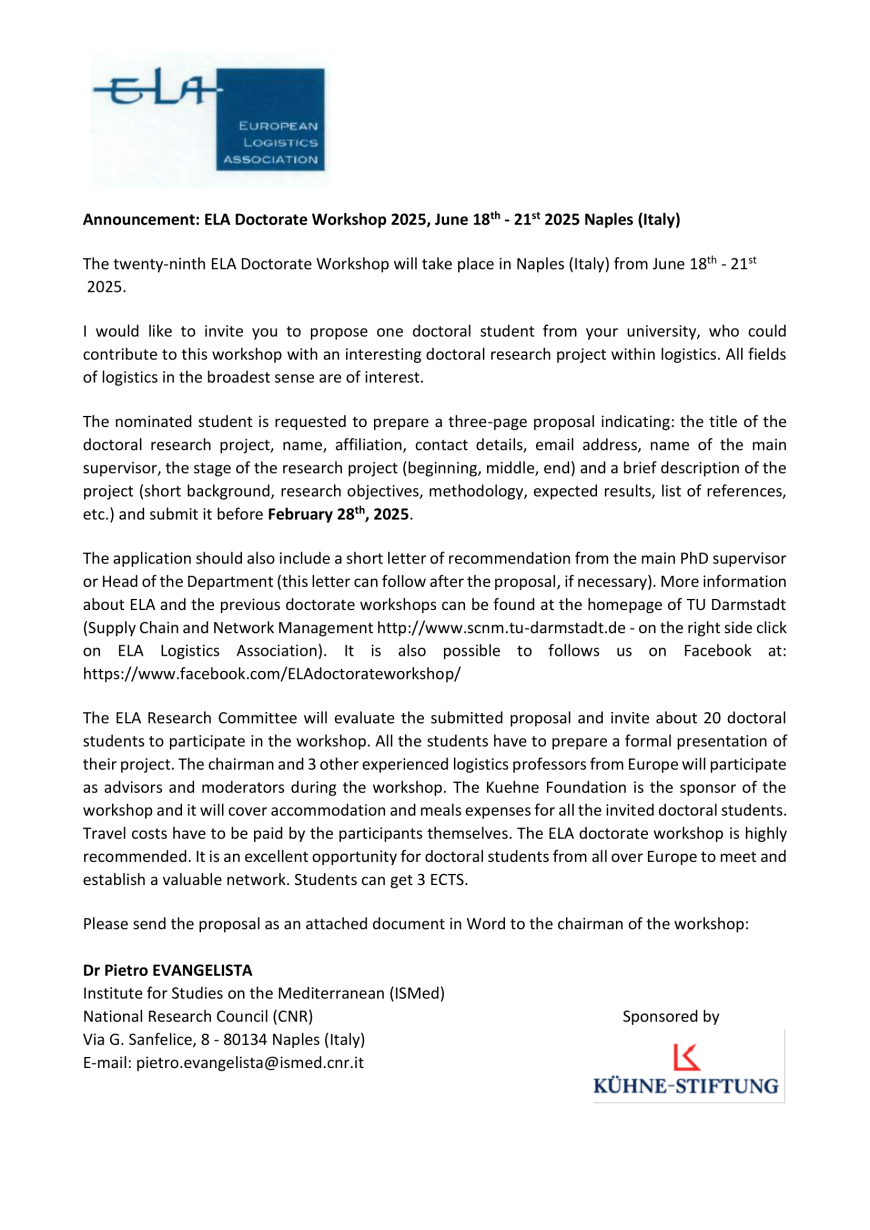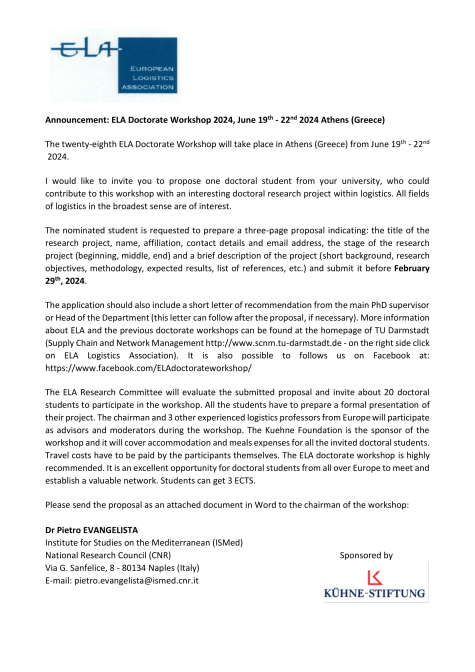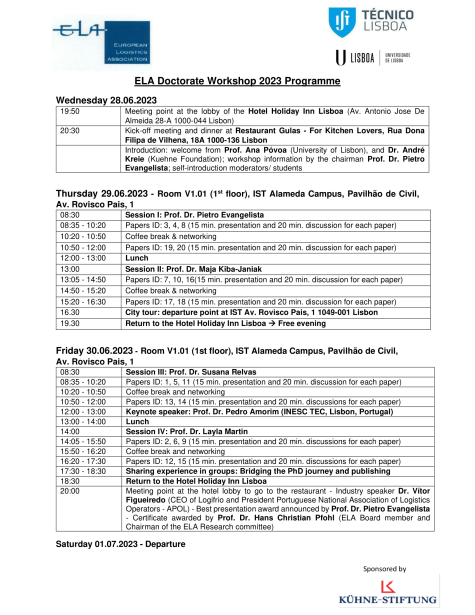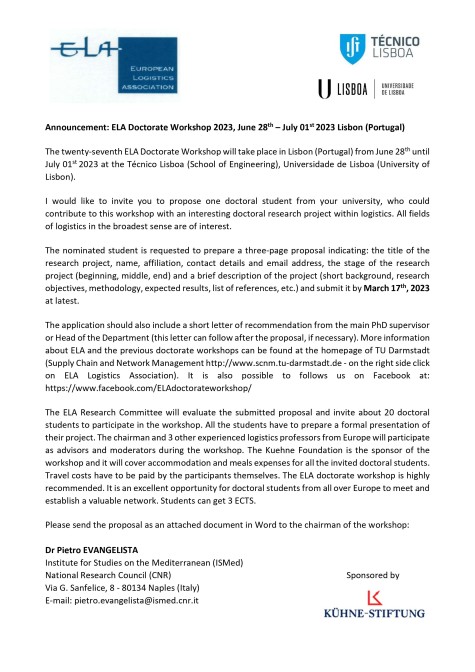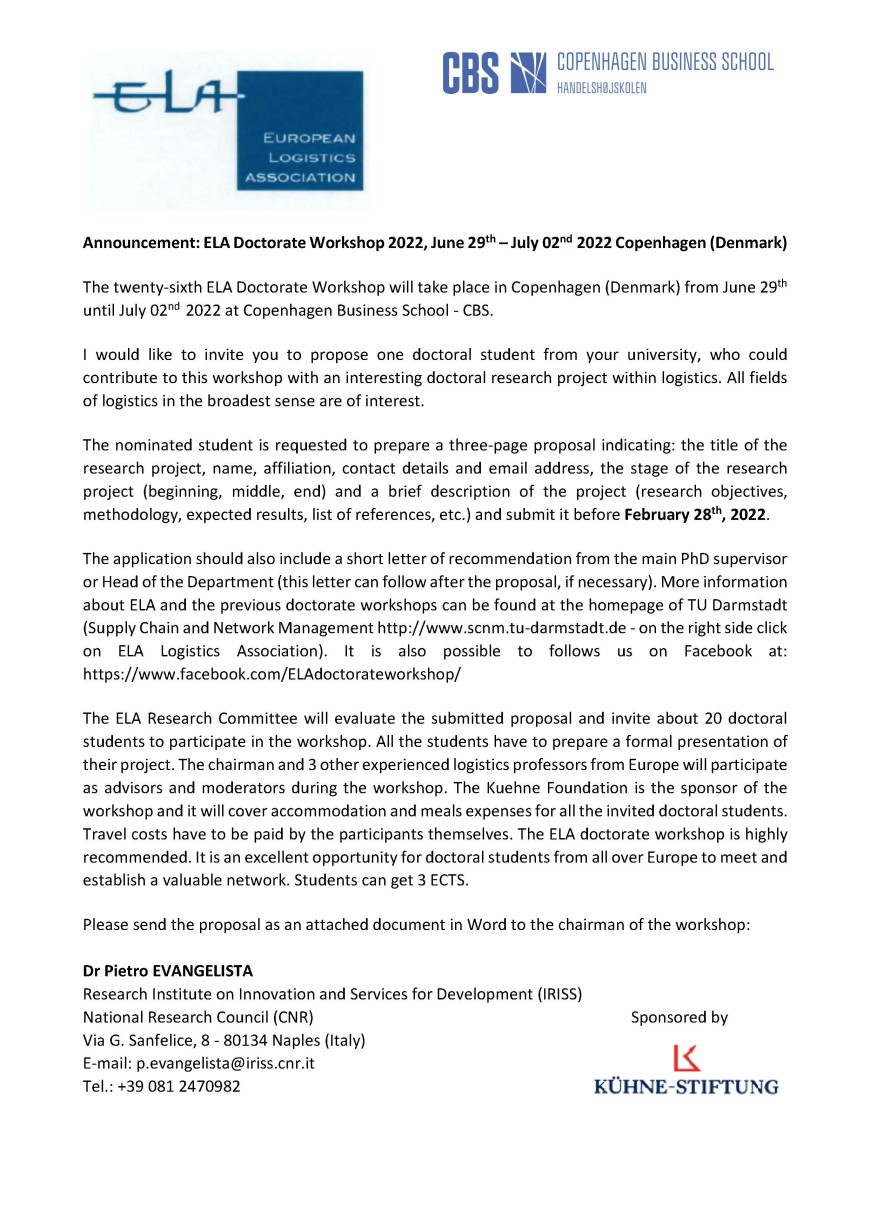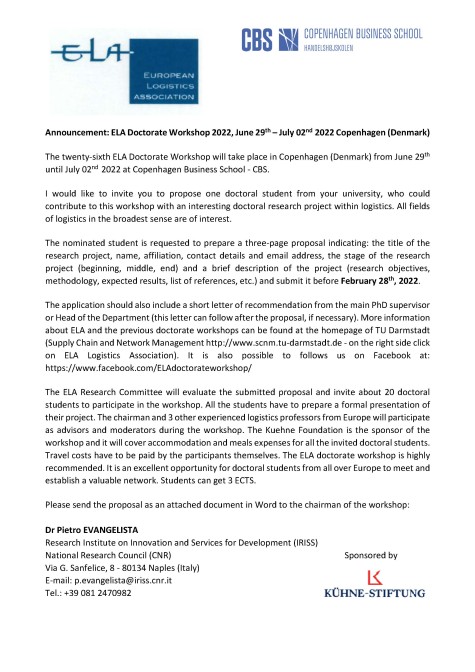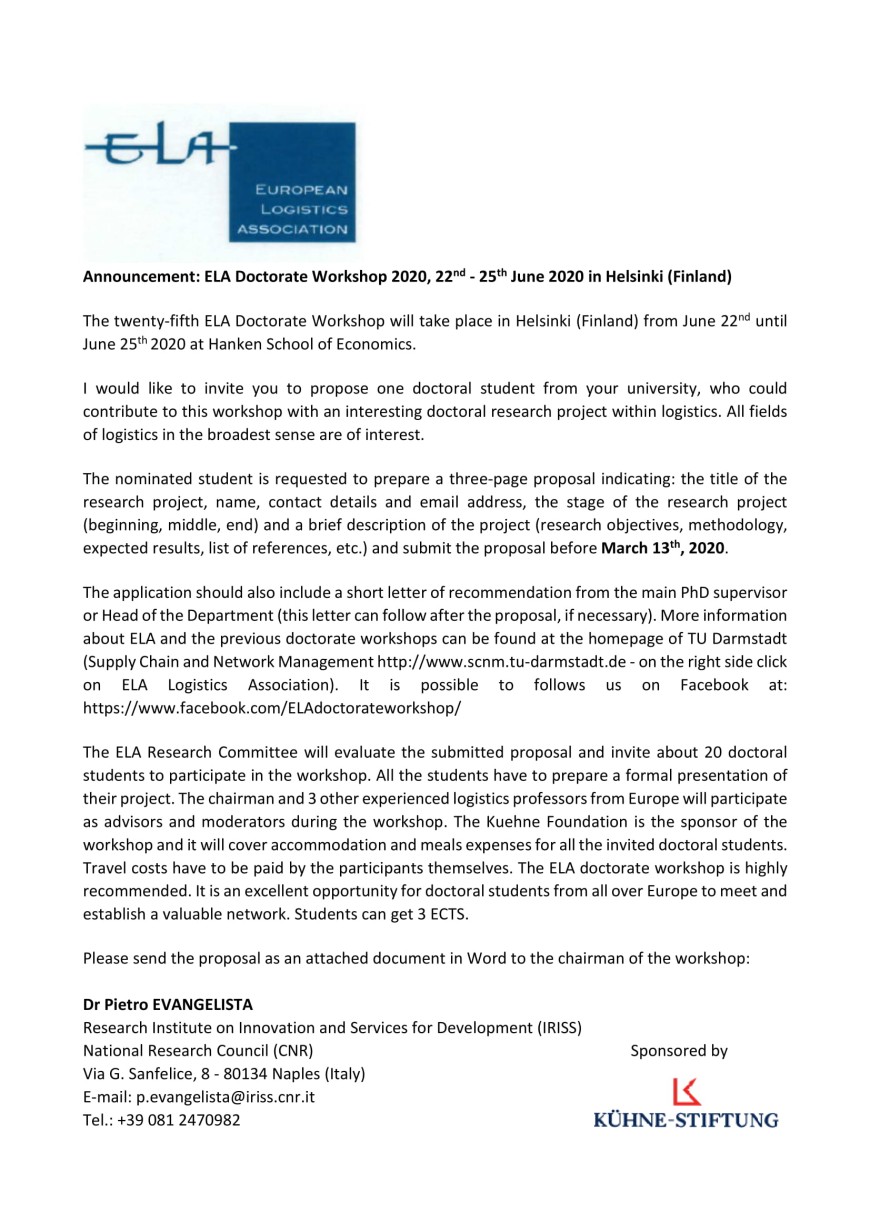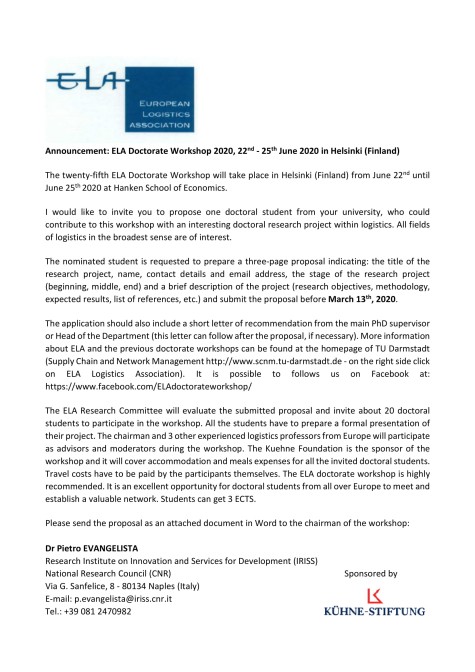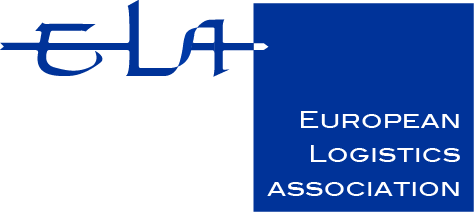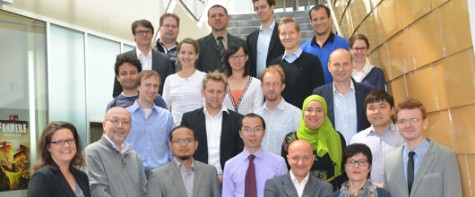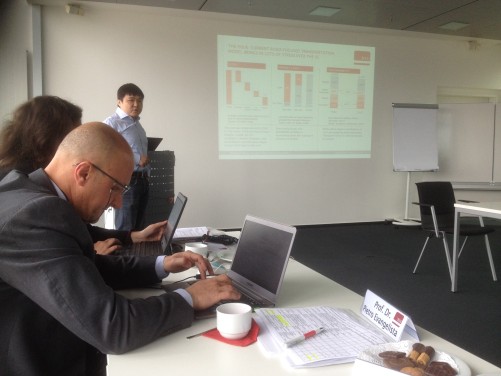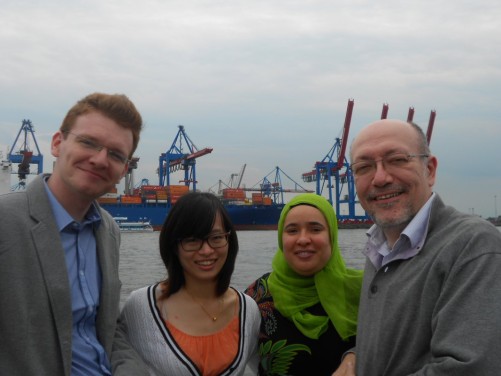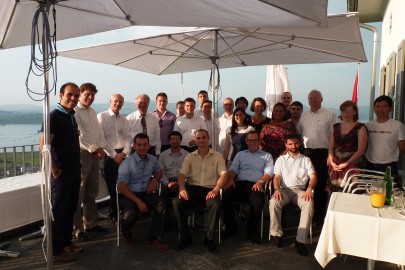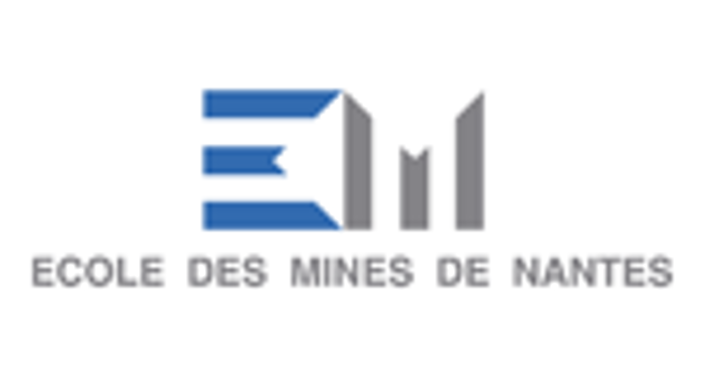ELA Doctorate Workshop 2025, June 18th-21st 2025 in Naples (Italy)
The deadline for the ELA Doctorate Workshop 2025 is extended to March 28th, 2025.
ELA – Doctorate Workshop 2024 Feedback
ELA DOCTORATE WORKSHOP 2024 REPORT
Venue: Athens University of Economics and Business (AUEB), Greece
Date: June 19th – 22nd 2024
INTRODUCTION
The 28th edition of the ELA Doctorate Workshop proved to be a resounding success, continuing its rich tradition of fostering academic excellence and knowledge exchange in the logistics and supply chain research community. Hosted by the Athens University of Economics and Business (AUEB) and generously sponsored by the Kuehne Foundation, the workshop brought together PhD students, moderators, and keynote speakers from across Europe and beyond.
This year’s workshop was remarkable for its diversity of participants and topics, a contribution to the growing importance of logistics research in addressing global industry challenges such as sustainability, digital transformation, and supply chain resilience. The workshop’s combination
of academic rigor, practical relevance, and collaborative dialogue made it a unique opportunity for participants to enhance their research and expand their professional networks.
PARTICIPATION
The geographic and thematic diversity of the participants was one of the workshop’s standout features. Table 1 highlights the international representation, with students hailing from 11 different countries, including Italy, Sweden, and Germany as the top contributors to this year edition.
Students by country of their universities: Italy 5, Sweden 4, Germany 3, France 1, The Netherlands 1, Poland 1, Finland 1, Belgium 1, UK 1, Bulgaria 1, Portugal 1. In total 20.
This cross-border collaboration underscores the global nature of logistics challenges and the importance of sharing knowledge and experiences across different EU countries. Table 2 provides further insight into the thematic focus of the workshop. The table also indicates the nationality of the student’s university.
Proposals by topic area
Urban logistics and last-mile delivery:
- Complexity reduction approaches for rich last-mile delivery scenarios (Germany)
- The transformation of urban freight systems toward sustainability (Sweden)
- Urban logistics in a port city (France)
- Sustainable logistics and preferences for green last-mile delivery (Italy)
- Transportation system in Urban Areas: Investigating the dual perspective of Mobility Service Provider and Logistics Service Provider (Italy)
- Logistics and E-grocery: Challenges and innovative solutions for last-mile delivery (Italy)
Transport route planning and management:
- Synchromodal Transport Re-planning: An Agent-Based Simulation Approach (Belgium)
- Route Planning in The Distribution of Medicinal Products by Road Transport Using Nature-Inspired Algorithms (Poland)
- Train Load Planning in Intermodal Transportation (Germany)
- Strategic Planning of the Transformation of Refueling and Charging Station Networks (Germany)
- Deep Controlled Learning for the Dynamic Delayed Time Window Assignment and Vehicle Routing Problem (The Netherlands)
- Integrating blood supply chain management – From tactical to operational level (Portugal)
- Scalable Fleet Management Control for Autonomous Haulage Systems in Mining Operations (UK)
Resilient and sustainable logistics/supply chain management:
- Leveraging technology to enable resilient and sustainable supply chains (Italy)
- The role of resilience in the healthcare supply chain: Contribution factors and levers for performance improvement (Italy)
- Development of a Supply Chain Resilience Maturity Model for Manufacturing Supply Chains (Bulgaria)
- Future Sustainable Logistics Business Models (Sweden)
Miscellaneous:
- Collaborative Logistics Preparedness in the Norwegian Defence (Norway)
- Just-in-Time arrival in port calls: potential and implementation (Sweden)
- Strengthening the capability of small-scale farmers: Exploring strategies for local food accessibility and market amid disrupted supply chains (Finland)
The table shows how the selected proposals may be roughly categorised into the following three topic areas:
- Urban Logistics and Last-Mile Delivery: As cities face increasing congestion and environmental challenges, this research area has gained prominence. Proposals explored sustainable urban freight systems, e-grocery logistics, and mobility solutions, reflecting the urgency to address last-mile delivery complexities.
- Transport Route Planning and Management: Topics included innovative planning techniques, AI-based routing, and intermodal transport strategies, highlighting the role of technology in optimizing transport and logistics performance.
- Resilient and Sustainable Logistics/Supply Chains: These proposals emphasized the critical need for supply chain resilience and sustainability, especially in the face of disruptions like climate change and geopolitical challenges.
The diversity of research topics ensured that participants gained a broader view of emerging issues and trends in the field of logistics and supply chain management, fostering interdisciplinary exchange.
WORKSHOP FORMAT
The structure of the workshop was meticulously designed to maximize the value for all participants. Each PhD student presented their work, followed by a 20-minute discussion session, where feedback was provided by moderators and fellow students. This format encouraged a constructive and open dialogue, with feedback extending beyond technical details to include methodological improvements, clarity in argumentation, and publication strategies. Several elements of the workshop stood out.
One element was the two keynote presentations. The first was given by Prof. Dr. Pavlos Eirinakis from the University of Piraeus who delivered an insightful academic keynote on “Data, Models, and Algorithms for Optimal Weather Routing: A Digital Twin Approach”. His talk inspired students to explore how the technical characteristics of vehicles (ships in this case) impact on costs and how digital innovations may contribute to logistics optimisation. The second speech was provided by Mrs. Eleni Bitsiou, Vice President of the logistics company 4 Synergy S.A. and Vice President of the Greek logistics association, provided an industry perspective on the evolving logistics landscape, emphasizing sustainability and future business models. Her presentation was particularly well-received for bridging theory and practice.
Another element was the interactive “Sharing Experience” session in which moderators facilitated discussions on navigating the PhD journey, focusing on networking strategies, publishing research, and overcoming challenges. This session provided valuable guidance for students at different stages of their doctoral studies.
Finally, an element that qualify the workshop are networking opportunities offered to the students. The workshop’s format included ample time for networking during coffee breaks, lunches, and social activities. The welcoming dinner and city tour in Athens were particularly appreciated for mutual understanding among participants.
STUDENT FEEDBACK
The results of the student satisfaction survey conducted after the conclusion of the workshop reflect its exceptional quality. Students were overwhelmingly positive about the workshop’s organization, content, and outcomes. Key highlights include:
Scientific Value:
Students praised the high-quality feedback from moderators and peers, which helped them refine their research.
The opportunity to present research to an international audience and receive questions from diverse perspectives was highlighted as an invaluable experience.
One student commented: “The diversity of fields, subjects, and methods was an important asset, rare in single-discipline conferences. The questions and suggestions I received were immensely helpful in improving my work.”
Organization and Hospitality:
The workshop was seamlessly organized, with comfortable accommodations, efficient transportation, and excellent facilities.
Social activities, including the city tour and shared meals, provided a perfect balance to the intense academic program. Students repeatedly emphasized the welcoming and supportive atmosphere created by the hosts.
Point of strengths:
Diverse Participation: Students appreciated the chance to interact with peers and experts from various countries, universities, and research areas.
Constructive Feedback: The feedback sessions were viewed as the most valuable aspect of the workshop, with moderators providing actionable suggestions to strengthen students' work.
Networking Opportunities: The workshop fostered collaborations that may lead to joint research and future partnerships.
KEY OUTCOMES AND BROADER IMPLICATIONS
The ELA Doctorate Workshop 2024 demonstrated its critical role in shaping the next generation of logistics researchers. Beyond the immediate academic benefits, the workshop fostered a spirit of collaboration and innovation essential for addressing contemporary logistics challenges. Key outcomes include:
- Enhanced research quality: Students left with improved clarity and stronger arguments for their theses and publications.
- Professional development: Participants gained insights into networking, career progression, and publishing strategies.
- Building a global community: The workshop strengthened connections among PhD students, moderators, and institutions, promoting long-term collaboration.
The workshop’s ability to combine academic rigor with a supportive environment makes it an indispensable and high reputation event for doctoral students in logistics. As one student summarized: “This workshop was not only scientifically valuable but also inspiring and encouraging. It’s rare to find such a combination of professionalism and warmth.”
ACKNOWLEDGMENTS
The success of this year’s workshop would not have been possible without the generous support of the Kuehne Foundation represented by Dr. Andre Kreie and the exceptional hosting team at AUEB. Special thanks go to Prof. Dr. Ioannis Fragkos and Prof. Dr. Panagiotis Repoussis for their outstanding organizational efforts and hospitality.
We also extend our gratitude to the moderators, who provided thoughtful feedback, and to the keynote speakers for their inspiring contributions. Finally, congratulations to the student Tjard Bätge from the Technische Universität Braunschweig (Germany) for receiving the Best Presentation Award.
CONCLUSION: LOOKING AHEAD
The ELA Doctorate Workshop 2024 reaffirmed its value as a cornerstone event in logistics research. By bringing together emerging scholars, experienced moderators, and industry 6 experts, the workshop fosters an environment where ideas are shared, collaborations are forged, and the next generation of logistics professionals is empowered.
With overwhelmingly positive feedback and valuable outcomes, the 2024 workshop sets a high standard for future editions. We look forward to continuing this tradition of excellence and innovation in the years to come.
Edited by: Pietro Evangelista in collaboration with Hans-Christian Pfohl, Danuta Kispersa Moron, Stefan Minner, Mats Abrahamson, Michael Browne, Nathalie Fabbe-Costes, Katreinn Ramaekers and Ioannis Fragkos
Sponsored by: Kühne Fundation – Andrè Kreie
ELA – Doctorate Workshop 2023 Feedback
ELA DOCTORATE WORKSHOP 2023 REPORT
Venue: Técnico Lisboa, Universidade de Lisboa, Lisbon (Portugal)
Date: 28th June – 01st July 2023
by Pietro Evangelista
The call for papers of the twenty-seventh edition of the ELA Doctorate Workshop was sent out by Prof. Hans-Christian Pfohl on behalf of the ELA Research committee on late November 2022. It was disseminated in the local logistics research communities and networks by the committee members with a first deadline fixed on 28th February 2023 that was extend until 17th March 2023. On 18th April 2023, the ELA Research committee selected 20 students during the committee meeting held online on Zoom platform. One student that declined to participate was subsequently replaced by another student. Here is the distribution of the participating students by the country of their university.
Number of students by Country: Germany 5, Italy 4, Sweden 3, France 2, The Netherlands 2, Poland 1, Finland 1, Belgium 1, USA 1. In total 20.
In May 2023 three moderators confirmed their attendance to the workshop. Two speakers were also recruited. The academic one was Prof. Pedro Amorim (INESC TEC, Lisbon, Portugal), while the industry speaker was Vítor Figueiredo (CEO of Logifrio and President of Portuguese Association of Logistics Operators – APOL).
The team of the workshop 2023 was as follows:
Chairman:
- Prof. Dr. Pietro Evangelista (ISMed-CNR, Italy)
Moderators:
- Prof. Dr. Pietro Evangelista (ISMed-CNR, Italy)
- Prof. Dr. Susana Relvas (Técnico Lisboa, Universidade de Lisboa, Portugal)
- Prof. Dr. Maja Kiba-Janiak (Wroclaw University of Economics and Business, Poland)
- Prof. Dr. Layla Martin (Eindhoven University of Technology, The Netherlands)
Keynote speaker:
- Prof. Dr. Pedro Amorim (INESC TEC, Portugal)
Dinner speaker:
- Dr. Vítor Figueiredo (CEO of Logifrio and President of Portuguese Association of Logistics Operators – APOL, Portugal)
I wish to acknowledge Dr. Andrè Kreie from the Kuehne Foundation for his continuous financial support to the workshop. A special thank goes to Prof. Susan Relvas and her team for the excellent support they gave to the organisation of the workshop.
All the 20 students submitted their proposals, and a Dropbox folder was created to share information/documents with students, moderators and committee members. The allocation of the moderators and students over different papers was defined on mid-June 2023 by the chairman. The moderators have been associated to the students considering their own background and the topic of the proposals. This facilitated the provision of appropriate suggestions and comments to the students.
All the 20 students successfully attended the workshop from June 28thuntil July 01th2023. As in the previous year, the time allocated to the discussion after the student’s presentation was extended from 10 minutes to 20 minutes and the introductory session was moved to the dinner held on Wednesday evening 28thJuly where the time for chairman and moderators’ self-presentation was reduced from 15 to 5 minutes. As in previous editions, the workshop was organised to have a PhD student presentation first and three discussants (one moderator and two other PhD students) immediately after the presentation. Each moderator introduced the session topics in 5 minutes at the beginning of his/her own session.
The academic keynote speaker, Prof. Dr. Pedro Amorim, delivered a very interesting speech entitled „Myths of online delivery: Using data and analytics to unveil what customers truly want“ on Friday 30thJune 2023.
On the same day, the moderators team implemented the “Sharing experience in groups: Bridging the PhD journey and publishing” exercise that was aimed at discussing: i) the use of conferences to establish networks, to prepare publications, and to find academic jobs, etc.; ii) the priorities in the different phases of the PhD project and iii) the challenges in the different phases of the PhD project.
During the final dinner on Friday 30thJune, Dr. Vítor Figueiredo CEO of Logifrio and President of the Portuguese logistics industry association delivered an attractive talk on the main practical challenges that logistics service providers are facing in the current industry and geopolitical scenario. The ELA certificates were handed over to the students by Prof. Dr. Hans-Christian Pfohl. Finally, the student Aïcha Leroy from the Research Group Logistics, Faculty of Business Economics, Hasselt University (Belgium) received the best presentation award for her outstanding presentation entitled “Data-driven warehouse optimization: A focus on maverick picking”.
After the workshop, the chairman sent to the students the short questionnaire to understand their level of satisfaction in relation to different aspects of the workshop. The feedback received from students are all very positive. The PhD students were generally very happy about the appropriate feedback received from moderators and the interesting discussion and networking with other students as a result of more time available. The hospitality and the facilities of the hosting organisation were very good and also very much appreciated. Below are summarised the feedback received from the students that participated in our survey.
ELA DOCTORATE WORKSHOP 2023
RESULTS OF THE STUDENTS SATISFACTORY SURVEY
Overall perception and points strength
Scientific usefulness: The ELA Doctoral Workshop was a fantastic experience that helped me grow as a researcher: meeting with colleagues to share our experiences and research ideas offered a broader overview of the themes being studied and the methodologies employed. Thus, offering the opportunity to learn more about logistics research. Regarding my research, I have received valuable comments and hints on how to improve my work further. Furthermore, exchanging ideas with other colleagues has offered new perspectives and points of view to explore.
Hospitality and management: Hospitality and management of this event have been excellent, with no negative remarks to highlight.
Point of strength: Sharing a few days with colleagues from other European universities is a valuable experience that helps broaden the participants' horizons. The time allocated for each presentation is long enough to properly explain the highlights of one’s research and thus receive valuable comments and suggestions.
Scientific usefulness: ELD doctoral workshop proved to be an invaluable experience as it not only allowed me to network with like-minded young Ph.D. researchers, but also exposed me to a wealth of knowledge and expertise. Engaging in discussions and exchanging ideas with fellow researchers and professors sparked new perspectives and enriched my understanding of the field. I made meaningful connections that I believe will be of great value in the future, providing potential collaborative opportunities and access to valuable resources. Attending this workshop has undoubtedly expanded my professional network and equipped me with a broader foundation for my future research endeavours.
Hospitality and management: The management of the workshop was commendable. The meticulous attention to detail in the workshop's management contributed significantly to its success, creating an environment that fostered learning, connection, and enjoyment. I must also applaud the fantastic choice of accommodation, both in terms of the city itself and the hotel, which provided a comfortable and conducive environment for networking and relaxation.
Point of strength: The workshop presented an exceptional networking opportunity with fellow Ph.D. students, who will become valuable future colleagues and collaborators. Ample time and space were dedicated to networking, with short breaks between sessions and a city tour, fostering meaningful connections and discussions on the topics. In addition, presentation slots and topics were well organized, providing valuable exposure to high-level academic presentations on logistics and supply chain management research.
Scientific usefulness: The workshop greatly expanded my knowledge of logistics research. The presentations were informative, and the discussions that followed each one deepened my understanding. I particularly appreciated the long breaks, which allowed me to connect with other participants. The connections I made during these breaks now hold significant value and have expanded my professional network.
Hospitality and management: I found the workshop content to be highly valuable, striking a good balance between work and leisure. While I thoroughly enjoyed the activities included, I must mention that the second day of presentations felt a bit long, making it challenging to maintain focus towards the end of the day. However, aside from that, every activity offered in the workshop was enjoyable. The accommodation was also excellent, having a fantastic location near the university. Point of strength:
I highly appreciated the broad range of logistics topics presented during the workshop. It expanded my logistics research knowledge and taught me different methodologies to tackle research problems.
Scientific usefulness: It is helpful to see a broader scope of Logistics studies, especially the qualitative ones with which I am less familiar. Moreover, I find several engaging presentations and see ranges of different methodologies which may be helpful for my future work. The discussion sessions are valuable as we exchange many ideas and help me reflect on several model assumptions. Fortunately, a few participants are in the same area of research in the combined freight and passenger transportation. This is great as we share our thought on each other work. Apart from the formal presentation, I also discussed with the participants during the day.
Hospitality and management: I think the management is excellent. We have a whole pack of 2 dayprograms. The restaurant and hotel and the provided meal are great. I like the city and the university very much and enjoy the provided sightseeing tour.
Point of strength: The scientific activities are great. Thank you to all the participants, moderators and organizers for this event and for providing excellent feedback. I think 15 min presentation is long enough to learn some concepts from one work, and we also have pretty enough discussion time.
Scientific usefulness: I learned a lot from the other PhD students’ presentations, especially about all the different research topics related to logistic. It really helped be to broaden my perspective on my research.
Hospitality and management: The management during the workshop and hospitality were excellent.
Point of strength: Interesting presentations by students and from all keynote speakers, and the friendly atmosphere throughout the whole workshop. Also, the time to network and get to know each other was really appreciated.
Scientific usefulness: The workshop was a great opportunity to meet young researchers and professors in my research field. I found out very useful and interesting to attend the other students’ presentation: it gave me the opportunity to reflect upon new research ideas (new theories, new research topics and new methodologies). At the same time, I appreciated receiving feedback by both professors and students on my research work path. If I need, in the future I will contact the students and professors that I met during the workshop.
Hospitality and management: The management of the workshop was excellent. According to me, the workshop program was very well constructed with the right division of the daily program between scientific and leisure activities. The organisation of the scientific activities with the sessions, keynote speeches and final group work was very good. Leisure activities (dinners and city tours) were also very well organised enjoyable. The accommodation (the city and the hotel) was fantastic.
Point of strength: According to me, the main points of strength of the workshop are:
1) the program. As I said, I really appreciate the organization of the workshop including both scientific and leisure activities; 2) internationality. Meeting students from university in and extra Europe was a good opportunity to understand similarities and differences among the research approaches, the research topics, and the structure of the PhD programs; 3) heterogeneity of research topics. Although within the same research stream, the topics addressed by the students were quite different. This gave me the opportunity to know more about the existence of multiple research topics in field of logistics and supply chain.
Scientific usefulness: It was extremely useful to have a broad overview of the research in logistics. This was especially interesting for me because I work on a project which aims at making new data available for researchers in logistics, and industrial actors, but my personal technical work is not directly related to logistics. Therefore, the different presentations, the feedback, and the discussions (after the presentations and during breaks) will obviously give me some ideas to adapt the focus of my work. I also strongly believe that meeting other PhD students and professors in a friendly / kind environment as in this workshop might be useful for the future.
Hospitality and management: Great location, accommodation and management!
Point of strength: High diversity of research projects & High-level presentations; Kind & Friendly environment; Excellent idea to propose leisure activities, it is great and helps to know each other. From a professional point of view, I would say it also helps for networking; Industry & Academic guest speakers.
Point of weaknesses and suggestions for improving the workshop
Point of weaknesses: The schedule felt a little tight at times.
Suggestions for improving further editions of the workshop: I would suggest extending the doctoral workshop by one additional day, in order to more easily manage and spread the presentations of the 20 participants.
Point of weaknesses: None
Suggestions for improving further editions of the workshop: None
Point of weaknesses: I found no point of weaknesses
Suggestions for improving further editions of the workshop: Please keep up the good work!
Point of weaknesses: None
Suggestions for improving further editions of the workshop: Do not make too many changes as it was a very useful and fun workshop.
Point of weaknesses: The allocation for student discussion can be improved. I think it is better to match the participants to those who adopt similar approaches to have more profound technical comments.
I like guest speakers from academia and industry; however, they only have short sessions, especially the industry speaker. It would be better if they were given more time and if they could participate in our presentation. This may even give broader and more practical feedback for our research.
Suggestions for improving further editions of the workshop: I think it would be better to add another half or one day to the program. We can then split the program and give more time for the participants to know each other. Also, one of the moderators may come from the industry to provide more comprehensive feedback. I also enjoy the Phd session at the end; however, it is too short.
Point of weaknesses: Maybe the daily program was a bit intense, because there was a lot to take in and the day started very early, so the attention span went down by the end of the day.
Suggestions for improving further editions of the workshop: None, I really enjoyed the workshop!
Point of weaknesses: There could have been a bit more time for discussions amongst the PhD students and professors. Most of the time was packed with presentations which didn´t leave so much time left.
Suggestions for improving further editions of the workshop: It was so great! Maybe you could include a bit more time for open discussions on topics
Point of weaknesses: I don’t see any point of weaknesses.
Suggestions for improving further editions of the workshop: I want just to suggest keeping the organization and the structure of the workshop good as it was. I would introduce maybe, during the first day another keynote speech at lunch time. I think that the keynote speech of professor Pedro Amorim was really useful and I would have liked to have another one.
Point of weaknesses: Maybe not enough sessions for non-PhD student speakers. It’s too short!
Suggestions for improving further editions of the workshop: Maybe a longer workshop to have more guest speakers, or presentations / speaks from the professors of the team, or a longer discussion about the PhD process at the end. Maybe give more insight on how the organization of this kind of workshop is made? Maybe a more detailed presentation of Kuehne Foundation and ELA? Make it bigger: transform this 2-day workshop into a 1-week summer school. Maybe Kuehne + Nagel is not the only company interested in financing a part of this kind of event?
Naples, 04.11.2023 Pietro Evangelista
ELA – Doctorate Workshop 2022 Feedback
ELA DOCTORATE WORKSHOP 2022 REPORT
Venue: Copenhagen Business School – CBS, Copenhagen (Denmark)
Date: 29th June – 02nd July 2022
by Pietro Evangelista
The call for papers of the twenty-sixth edition of the ELA Doctorate Workshop was sent out by Prof. Hans-Christian Pfohl on behalf of the ELA Research committee on late November 2021. It was disseminated in the local logistics research communities and networks by the committee members with a first deadline fixed on 28th February 2022 which was subsequently extended until 18th March 2022.
In May 2022 three moderators confirmed their attendance to the workshop. Two speakers were also recruited. The academic one was Britta Gammelgaard (CBS, Denmark), while the industry speaker was the Managing Partner of Panticon (Denmark) Thomas Poulsen.
The final team of the workshop 2022 was as follows:
Chairman:
- Prof. Dr. Pietro Evangelista (ISMed-CNR, Naples, Italy)
Moderators:
- Prof. Dr. Pietro Evangelista (ISMed-CNR, Naples, Italy)
- Prof. Dr. Prof. Katrien Ramaekers (Hasselt University, Belgium)
- Prof. Dr. Maja Kiba-Janiak (Wroclaw University of Economics and Business, Poland)
- Prof. Dr. Dong-Wook Song (World Maritime University, Sweden)
Keynote speaker:
- Prof. Dr. Britta Gammelgaard (CBS, Denmark)
Dinner speaker:
- Dr. Thomas Poulsen (Managing Partner at Panticon, Denmark)
I wish to thank the secretary of the Department of Operations Management at CBS Mrs. Yanina Gross who supported the organisation of the workshop in an extraordinarily effective manner from an administrative and practical point of view. I wish also to acknowledge Dr. Andrè Kreie from the Kuehne Foundation for its constant financial support of the workshop.
A Dropbox folder was created to share information/documents with students, moderators and committee members. The allocation of the moderators and students over different papers was defined on mid-June 2022 by the chairman. The moderators have been associated to students on the basis of the consistency between their own background and the topic of the proposals. This facilitated the provision of appropriate suggestions to the students.
All the selected students successfully attended the workshop from 29th June until 02nd July 2022. This year, the time allocated to discussion after the student’s presentation was changed. This follows the decision taken by the ELA Research committee to extend the time for discussion for each presentation (from 10 minutes to 20 minutes), to reduce time for the session introduction (from 15 minutes to 5 minutes) and to move the time for chairman and moderators’ self-presentation at the dinner on Wednesday 29th July evening. As in previous editions, the workshop was organised to have a PhD student presentation first and three discussants (one moderator and two other PhD students) immediately after the presentation. Each moderator introduced the session topics in 5 minutes at the beginning of his/her own session.
The academic keynote speaker, Prof. Dr. Britta Gammelgaard, delivered a very stimulating speech entitled „Supply chain management in a post-covid era: new pathways for research“ on Friday 01st July.
On the same day, the moderators team implemented the “Sharing experience in groups: Bridging the PhD journey and publishing” exercise that was aimed at discussing: i) the use of conferences to establish networks, to prepare publications, and to find academic jobs, etc.; ii) the priorities in the different phases of the PhD project and iii) the challenges in the different phases of the PhD project.
During the final dinner on Friday 01st July, Dr. Thomas Poulsen managing Partner at Panticon (Denmark) delivered an interesting speech on the logistics of the offshore wind industry. The ELA certificates were handed over to the students by Prof. Dr. Hans-Christian Pfohl. Finally, the student Juan Pablo Castrellon from the Division of Service Management and Logistics, Chalmers University of Technology (Sweden) got the best presentation award for his outstanding presentation entitled “Managing freight curbside parking for livable streets”.
After the workshop, the chairman sent to the students the short questionnaire to understand their satisfactory level in relation to different aspects of the workshop. The feedback received from students are all very positive. The PhD students were generally very happy about the good feedbacks received from moderators and the interesting discussion and networking with other students as a result of more time available. The hospitality and the facilities of the hosting organisation were also very much appreciated. Below are summarised the feedbacks received from a number of students participated in the workshop satisfactory survey.
ELA DOCTORATE WORKSHOP 2021
RESULTS OF THE STUDENTS SATISFACTORY SURVEY
Overall perception and points strength
Scientific usefulness: I received some good comments on my presentation and hand-in. I learned a lot from the other PhD students’ presentations. The networking was really good as well, and it could lead to collaboration in some way in the future with people having quite similar research topics.
Hospitality and management: Very good from a hospitality perspective. Regarding management I think it would be good to enforce the time limit for the presentation much more strictly, we were always behind schedule even though there were 2 students less than the original plan. Perhaps the moderator of each session could keep track of the time, similar to what was done in the last few sessions.
Point of strengths: Interesting presentations by students and the keynote speech from professor Gammelgaard. Very good hospitality; Input to research; Networking
Scientific usefulness: I think the feedback received as well as the presentations seen will allow me to outline clearly my research theoretical and practical contributions.
Hospitality and management: Everything was managed very well, enjoyed the walks to school and all the breaks we had to interact with each other. The dinners were amazing.
Point of strengths: The structure of the workshop was very good, and the feedback received from the professors and other students were great
Scientific usefulness: I have learned a lot about a whole new side of logistics. That was very useful. I received several interesting questions about the business case of my case study, which were also helpful.
Hospitality and management: Perfect – thank you!
Point of strengths: Well organised, interesting presentations. The extra time for student questions compared to previous editions was very well used.
Scientific usefulness: – it exceeded my expectations. Feedback from both the moderators and the other students was very in-depth both methodologically and content-wise.
Hospitality and management: 100%. Thanks to all organizers for that.
Point of strengths: Maybe a little less program per day would be nice, because all the input was a lot to take and the concentration went down by the end of the day. Networking and finding other researchers in the field, good mix of program and free time.
Scientific usefulness: I learned a lot about the different methodologies and frameworks that can be useful for different purposes and fields in logistics. Hospitality and management: Amazing!!! Thank you so much for the special vegetarian meals, which were highly thoughtful. As the lunches were buffets, we vegetarians/special diets can just pick the choices that correspond to our diet… (in order to make the lunch planning easier than special vegetarian meals). Point of strengths: The keynote speakers, the wide variety of logistics related topics, the atmosphere. The extra time that students had to connect and get to know each other was highly appreciated, for purposes of furthering work-related discussions, and to set a friendly atmosphere.
Scientific usefulness: For this year, many topics and presentations are focused on empirical research/case study/qualitative research. Hence, in that perspective one can broaden the scope of knowledge and exchange many ideas.
Hospitality and management: The management during the workshop and hospitality were at the best as one can expect. Especially, Prof. Evangelista made sure that everyone could feel comfortable and freely express their ideas on their research. Again, many thanks to the professors and committee members who gave this opportunity to the PhD students.
Point of strengths: – The atmosphere was very welcoming and friendly
– Different research domains and methodologies were brought up and gave an opportunity to think about a broader scope of logistics and supply chain management.
– The professors were very approachable
Scientific usefulness: I found the feedback received very helpful. The suggestions and questions from moderators and students let me consider the weak points of my PhD and think about how to improve them.
Hospitality and management: I loved the atmosphere and management style J I truly enjoyed the workshop.
Point of strengths: Excellent networking and the opportunity to meet researchers with similar interests offer possibilities to cooperate in future.
Scientific usefulness: Overall, I would like to thank the organizers for their time and effort regarding the ELA doctoral workshop. The workshop exceeded my expectations! The ELA doctoral workshop was highly useful for my scholarly development. First, the workshop offered an opportunity to present my research project on an aggregated level to my peers. Second, the feedback I received from peers and moderators offered a new perspective on my research project. Third, the workshop offered an important opportunity to meet other young logistics researchers. Given the coronavirus pandemic, such opportunities have been very scarce in recent years.
Hospitality and management: The workshop was professionally organized. The location of our hotel was very central. The two dinners offered an opportunity for informal exchange about research and doctoral education.
Point of strengths: -Excellent selection of students from various backgrounds, universities, and countries; – High-profile moderators with relevant research background for the various sessions
-High-quality presentations; -Excellent academic keynote speaker!
Point of weaknesses and suggestions for improving the workshop
Point of weaknesses: Even though the presentations were very interesting, it is difficult to stay focused for two full days. Perhaps there could be some sort of activity in the middle to “active” all students, perhaps a short discussion about some PhD related issue. If the schedule says the first presentation should start at 8.00, then presentation should start at that time, the start was delayed a bit on both days.
Suggestions: Enforce presentation time limit more strictly in order to follow the schedule and allow for more discussion. Include some activity so that it is not only presentations for two full days, something similar to the final discussion session but not only at the end of the workshop. Would be good to know which students have cancelled their participation in advanced (if possible). You could then perhaps be assigned to another student’s proposal that is actually attending the workshop. Perhaps have some short social get-to-know each other “game” or activity on the first day when you have a few minutes to talk with everyone, both PhD students and moderators perhaps.
Point of weaknesses: Time keeping and some of the student presentations were not very well structured, or even clearly presented.
Suggestions: Maybe trying to have group discussions on the improvements we have to make to our research, common points to make research stronger.
Point of weaknesses: The schedule would have worked a bit better, had the students been forced to stick to 15min more strictly. The planning was fairly tight.
Suggestions: That’s perhaps inevitable, but adding a bit more slack in the schedule might be something to consider for future editions.
Point of weaknesses: Could be a little less program time per day. Instead of 9-10 people presenting each day, maybe a maximum of 8 would be better.
Suggestions: Maybe starting at 8 in the morning was a little early, one was hardly able to enjoy the breakfast (since the hotel was kind of far from the CBS).
Point of weaknesses: The discussions sometimes lacked depth. For the Q&A representatives, it seemed that sometimes the submissions to read were lacking content, or not detailed enough on the topic presented to prepare useful and strong questions.
The presentations should be cut at 15 minutes. I don’t think that the program is too packed if the schedule is kept by upholding the presentation time.
Suggestions: Maybe the slides should be sent a few days in advance to the Q&A representatives, for the purpose of preparing in-depth questions?
Point of weaknesses: – Time schedule was sometimes a bit too tight; – A bit more constructive feedback could have been given if the presentations are separated by methodological focuses
Suggestions: The students can stick to the given presentation time (15min) more strictly.
- Three days program with less compact schedule per day would be nicer to have a bit more discussion and flexibility
Point of weaknesses: I feel that the time allotted for presentations should be the same for everyone and kept more strict so that everyone has the same opportunity to learn how to manage and keep the time of presentations.
Suggestions: Perhaps the schedule might be a bit less tight. The workshop was simply great but also very intense.
Point of weaknesses: – Too little time for in-depth discussion; – It is difficult to formulate relevant questions based on the 2-3 pages proposals; – The program was quite packed, perhaps a shorter daily program could be a good idea.
Suggestions: – Perhaps the program could start a little bit later than 8 in the morning (especially because it also took a while to walk to CBS).
ELA Doctorate Workshop 2022, June 29th-July 02nd 2022 in Copenhagen, Denmark
The deadline for the ELA Doctorate Workshop 2022 is extended to march 18th.
ELA – Doctorate Workshop 2021 Feedback
ELA DOCTORATE WORKSHOP 2021 REPORT
Venue: Lappeenranta University of Technology – LUT, Lappeenranta (Finland)
Date: 13th – 15th October 2021
by Pietro Evangelista
The organisation of the twenty-fifth edition of the ELA Doctorate Workshop was quite difficult as results of the COVID-19 impact that forced the committee to cancel the workshop on 2020 originally planned to be held at Hanken University in Helsinki (Finland). Once Hanken University cancelled all the meetings in person for the entire 2021, Lappeenranta University of Technology (LUT) offered to host the workshop in October 2021 after the date on June 2021 was cancelled. Nevertheless, due to the uncertainty generated by the COVID19 pandemic, LUT gave the final permission to held the workshop in presence on October on 10 September. Once the permission was achieved, more than one year was passed from the selection of students and a number of them were not able to attend the workshop on 2021. This requested to re-open the recruitment phase and we was able to have 20 students and four moderators confirmed by the end of July 2021. Unfortunately, after LUT gave the “green light” on 10 September, a number of students and moderators was not able to attend because of their universities did not gave the permission to travel to Finland. This forced us to recruit new students and moderators to replace those that were not able to attend. During the above different phases, the Research Committee members fully supported the organisation of the workshop through evaluating proposals and suggesting students to apply for the workshop.
On early October 2021, we were able to have 18 students and four moderators confirmed. The final workshop 2021 team was as follows:
Chairman:
- Prof. Dr. Pietro Evangelista (IRISS-CNR, Naples, Italy)
Moderators:
- Prof. Dr. Pietro Evangelista (IRISS-CNR, Naples, Italy)
- Prof. Dr. Jukka Hallikas (Lappeenranta University of Technology, Finland)
- Prof. Dr. Maja Kiba-Janiak (Wroclaw University of Economics and Business, Poland)
- Prof. Dr. Edward Sweeney (Heriot-Watt University, UK)
Keynote speaker:
- Prof. Dr. Hans Christian Pfohl (TU Darmstadt, Germany)
Dinner speaker:
- Dr. Kari Korpela (CEO of DBE Core Ltd, Finland)
All the selected students submitted their proposal so that both moderators and students can better comment on their work. A Dropbox folder was created to share information/documents with participants, moderators, committee members and the speakers. The allocation of the moderators and students over different papers was finalized on early October 2021. All 18 students were successfully attending the workshop from 13th until 15th October 2021. The workshop was organised to have a PhD students presentation first and three discussants (one moderator and two other PhD students) immediately after the presentation. Each moderator introduced the session topics in 10 minutes at the beginning of his/her own session. The moderators have been associated to students on the basis of the consistency between their own background and the topic of proposals. This facilitate the provision of appropriate suggestions to the students. In the programme, it was allocated a slot for allowing the moderators to present themselves and illustrate the main research areas in which they are specialised.
The keynote speaker, Prof. Dr. Hans Christian Pfohl, delivered a speech entitled „Era of Logistics: Logistics Excellence in a Changing World“ on Friday 15th October.
On the same day, the moderators team implemented the “Sharing experience in groups: Bridging the PhD journey and publishing” exercise that was aimed at discussing: i) the use of conferences to establish networks, to prepare publications, and to find academic jobs, etc.; ii) the priorities in the different phases of the PhD project and iii) the challenges in the different phases of the PhD project.
During the final dinner on Friday 15th October, we hosted the industry speech of Dr. Kari Korpela (CEO of DBE Core Ltd, Finland). The ELA certificates were handed over to the students by Prof. Dr. Hans-Christian Pfohl, head of the ELA Research Committee. Finally, the student Tiziana Modica from Department of Management, Economics and Industrial Engineering, Politecnico di Milano (Italy) was awarded the best presentation during the final dinner. Her presentation was entitled “Enhancing transportation process performance through Logistics 4.0 ”.
After the workshop, it was sent to the students the short questionnaire to understand their satisfactory level in relation to different aspects of the workshop. The feedback received from students are generally very positive. The PhD students were enthusiastic about the opportunity to get very good feedbacks from moderators and doing effective discussion and networking. Students were also happy about the visit to the Lappeenranta fortress and the evening program that was a further occasion for networking. The hospitality and the facilities of the hosting organisation were also very much appreciated. Below are summarised the feedbacks received from the students that participated in our satisfactory survey.
ELA DOCTORATE WORKSHOP 2021
RESULTS OF THE STUDENTS SATISFACTORY SURVEY
Overall perception and points strength
Scientific usefulness: It was useful to provide an overview of my general PhD trajectory and receive feedback on it. Personally, this got me thinking about where I really want to contribute with my thesis. Aside to that, giving the presentation was a good exercise to present ‘in person’ again. Hospitality and management: Everything was arranged very well, especially with the hotel included. It was also nice to visit another university for the workshop itself. The communication regarding the workshop in general was clear, especially in light of the Covid-19 situation. It was really great as well that the workshop was postponed until we could meet in person, rather than having it online. Point of strength: For me, one of the strengths of the workshop was that all students were allocated to be discussant. It was a great opportunity to receive targeted (and prepared) questions about the work in the PhD from fellow doctorate students, but also from the professors as moderators. I found it resulted in really interesting and insightful question sessions. On the other side, it was a useful exercise to prepare some questions myself for other presentations.
Scientific usefulness: Workshop had great value for me, I was able to see other participants field of study, the way doctoral project should look like. Regarding my project it was great to show my ideas and receive much feedback, not only from moderators, but also from other students. Hospitality and management: I felt very welcome and relaxed during whole workshop, so I think that’s good feedback for hospitality. From management point of view whole workshop was very tightly planned, which was difficult to keep all the timings in line. Point of strength: possibility to exchange view on project, European wide networking, seeing new areas of logistic development
Scientific usefulness: The feedback on the presented topic was very useful. In addition, the feedback to and discussion with other students was scientifically useful. Hospitality and management: Great! I really enjoyed the friendly, welcoming and very open atmosphere, which made it easy to get into contact with the other participants. The information prior to the workshop (travel, hotel, etc.) was very good and detailed as well. Point of strength: Good contacts to participants all over Europe. New insights into topics that are “further away” from my own research. Great scientific and non-scientific feedback and suggestions.
Scientific usefulness: Very good. I got a great overview and important impulses for my topic. Hospitality and management: Very good.
Scientific usefulness: Very useful from the point of a PhD student to listen to other works, and especially the subsequent discussions regarding not only our presentation, but also from others, as well. It was very insightful, and I believe it will truly help with the continuation of my research. It also showed me what to expect on my thesis defence. Mentors had great feedback and comments which is very valuable to me. Comments from peers were also amazing! I learned a lot in those two days. Hospitality and management: The workshop was very welcoming and with a friendly atmosphere. Organization, location and timetable for the event were great. The accommodation was amazing, as well as the dinner on the first and last day. Point of strength: Knowledgeable mentors, friendly atmosphere, great location and transport organization. Enough time to organize the arrival and departure, which makes the journey stress-free. Very insightful workshop with lots of knowledge and suggestions received.
Scientific usefulness: It was great to get to know different topics and methods. What can be used as inspiration at a given time. Furthermore, it was good to see that everyone is struggling with similar problems. The conversations and the making of contacts can be of further use in terms of friendship and/or cooperation. Also, the clear words of Prof. Pfohl on the process of publication opened my eyes once more and helped to internalize that communication and exchange is key in science. I think for my own project it helped me to understand that I shouldn't get lost in the little things within my project, but organize myself in a more goal-oriented manner. Hospitality and management: It was perfect (nice presentations, good locations, good food…). There is nothing to complain about…well, maybe the weather. Point of strength: The organizers were very organized and very personable. Great conference dinner. All in all, a great mix of events.
Point of weaknesses and suggestions for improving the workshop
Perhaps the schedule was a bit tight, with limited time for questions after the presentations. However, this is understandable given the number of students in the group. Suggestions for improving the workshop: Perhaps provide a bit more details about what should be in the presentation (that it has to be more about the general PhD topic, rather than a specific research project within the PhD).
Tight timings, not enough time to discuss personal projects with moderators. Location difficult to travel to. Suggestions for improving the workshop: More loose timings, exchange time to travel for the length of the workshop.
Point of weaknesses: Time limits for presentations seemed to be very strict at times and very relaxed at others. The information that the workshop will happen (for sure) was a bit late. Suggestions for improving further editions of the workshop: A bit more buffer time in between to avoid rushing through some things.
Suggestions for improving the workshop: More time for each student/presentation would have been very nice.
Point of weaknesses: It would be good to be mindful of the time for presenters – so that everyone gets the same amount of time for presenting and receiving feedback. Suggestions for improving the workshop: For next time, it would be good to create a group “chat” that would be open during the workshop, through Whatsapp or MS Teams, or any other way, a platform for the participants to interact on when not in the actual workshop. I would have liked more “group” work like the final activity on day 2, where we exchange information about the PhD process, journals we are trying to publish in, potential co-mentors or courses that would be interesting to us… Overall, a great workshop, thank you very much!
Point of weaknesses: I would have liked if the discussion about the students' experiences with publications / conferences had been more detailed; also with the subsequent reflection by the professors. For my own project, I think it would have been even more helpful if the methodical approach had been addressed more intensely. But I think it was rather difficult due to the high diversity of research methods. Suggestions for improving the workshop: Possibly invite fewer people, but instead expand the discussions on the presentations, as well as create further opportunities to work out something together.
ELA – Doctorate Workshop
Once again the ELA-Doctorate Workshop 2020 had to be postponed. New date: 13th – 16th October 2021 in Lapeenranta (FIN).
ELA – Doctorate Workshop
Due to Covid-19 virus, the ELA-Doctorade Workshop 2020 had to be postponed. New date: in Helsinki.
Student Survey ELA Doctorate Workshop 2019
|
Scientific usefulness: Perfect! I especially appreciate the time and preparation effort of the session chairs as well as the assigned students to give such detailed feedback and fuel the discussion. This was not only of great scientific use but also very motivating for me and my research project. Hospitality: Group events (dinners, city tour etc.) to get in contact with each other and meet people facing similar challenges as myself |
| Scientific usefulness: I have got very useful and inspirational feedbacks from both the moderators and the PhD peers. Also, I learned how the researchers in other research filed propose their research questions and design their research frameworks, which I think is beneficial for my future career path. Hospitality: The hospitality and the organisation is pretty good. |
|
Scientific usefulness: The questions I received during my presentation were very useful and I am considering the feedback and I am tweaking the research accordingly. Additionally, other research participants presentations were very interesting and even some of the feedback they got was useful to me as well. Hospitality: Extremely hospitable and very friendly environment |
|
Scientific usefulness: Very useful feedback from moderators. Moderators were very well prepared, relevant questions were asked and good feedback was given. Hospitality: Great hospitality |
|
Scientific usefulness: Especially the methodical feedback was very helpful. Hospitality: the event was very well organized. |
|
Scientific usefulness: Good. Valuable feedback in an important research stage. Hospitality: It was a great location and I very much appreciated the amicable and personal atmosphere. Perfect! |
|
Scientific usefulness: Feedback ok and helpful. Hospitality: Great – nothing to improve |
|
Scientific usefulness: Got more assured in doing my research. A good occasion for presenting and putting into words what I’m doing. Hospitality: Hospitality and management were great. I did not mind the rather intense schedule, and e.g. the city tour and dinners brought good balance to the seminar workload |
|
Scientific usefulness: Good and useful feedbacks. Thorough review of papers by the professors; The fact that the workshop was funded is a great and distinctive feature when compared to other Doctoral workshops/seminars. I hope the sponsors will not relent in subsequent editions. Hospitality: Good! |
Programm ELA Doctorate Workshop 2019
- Wednesday 26th June 2019
- Time Activity
- 18:30 Check-in at Courtyard by Marriot Edinburgh West (on H-W university campus)
- 18:45 Kick-off meeting and dinner at: Angels with Bagpipes Restaurant, 343 High Street, Edinburgh City Center
- Introduction to the workshop; Welcome by Dr. Anna Keyes, Heriot-Watt University and Dr. André Kreie, Kuehne Foundation; Workshop information by the chairman Prof. Dr. Pietro Evangelista; Brief self-introduction of chairman, moderators and students.
- Thursday 27th June 2019 – room EF26 in Esmée Fairbairn Building
- Time Activity
- 8:00 Session I: Prof. Dr. Pietro Evangelista (IRISS-CNR, Italy)
- 8:10 Papers: 1, 3, 9 (15 minutes presentation and 15 minutes discussions for each paper)
- 9:40 – 10:00 Coffee break & networking
- 10:00 Papers: 12, 20 (15 minutes presentation and 15 minutes discussions for each paper)
- 11:00 Moderators panel presentations on contemporary topics and discussions
- 12:30 Lunch
- 13:30 Session II: Prof. Dr. Jukka Hallikas (LUT University, Finland)
- 13:40 Papers: 5, 10 (15 minutes presentation and 15 minutes discussions for each paper)
- 14:40 – 15:00 Coffee break & networking
- 15:00 – 16:00 Papers: 14, 19 (15 minutes presentation and 15 minutes discussions for each paper)
- 17:15 City tour
- Free evening
- Friday 28th June 2019 – room EF26 in Esmée Fairbairn Building
- Time Activity
- 8:00 Session III: Prof. Dr. Simon Emde (Technische Universität Darmstadt, Germany)
- 8:10 Papers: 4, 6 (15 minutes presentation and 15 minutes discussions for each paper)
- 9:10 – 9:30 Coffee break and networking
- 9:30 Papers: 11,16 (15 minutes presentation and 15 minutes discussions for each paper)
- 10:30 Invited Speaker: Prof. Dr. Phil Greening (Heriot-Watt University, UK): Opportunities emerging from the environmental challenge
- 11:50 – 12:50 Lunch
- 12:50 Session IV: Prof. Dr. Violeta Roso (Chalmers University of Technology, Sweden)
- 13:00 Papers: 2, 8, 13 (15 minutes presentation and 15 minutes discussions for each paper)
- 14:30 – 14:50 Coffee break and networking
- 14:50 Papers: 15, 18 (15 minutes presentation and 15 minutes discussions for each paper)
- 15:50 – 17:00 Sharing experience in groups: Bridging the PhD journey and publishing (4 groups: 30 minutes group discussion; 5 to 10 min. presentation of results)
- 19:00 Dinner at Tower Restaurant, National Museum Scotland, Dinner speaker: Keith Evans – Certificate awarded: Prof. Hans Christian Pfohl (Member of the ELA Board and Chairman of the ELA Research committee)
- Saturday 29th June 2019 – Departure
ELA Doctorate Workshop 2019, June 26th to June 29th 2019 in Edinburgh (UK)
New: The deadline for the proposals is postponed to March 22nd 2019.
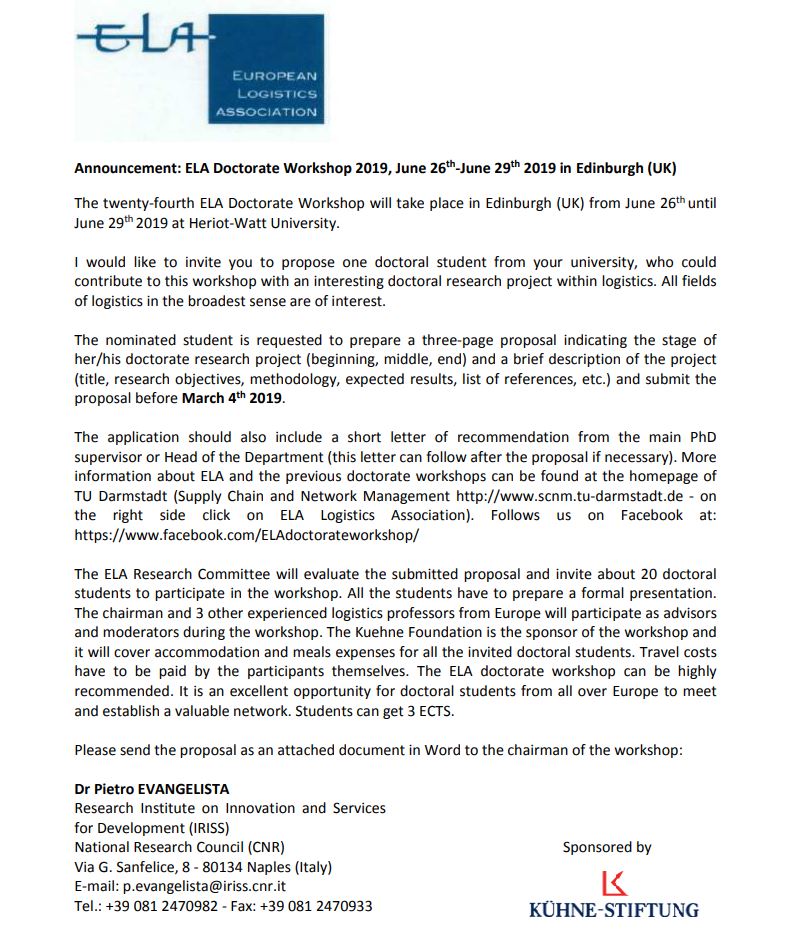
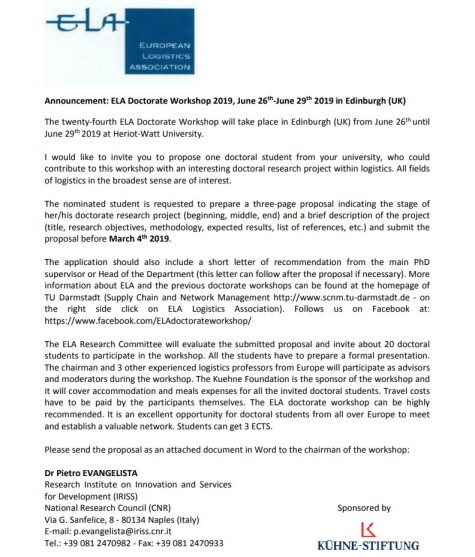
23-rd ELA Doctorate Workshop 2018, 27th to 30th of June 2018 in Naples (Italy)
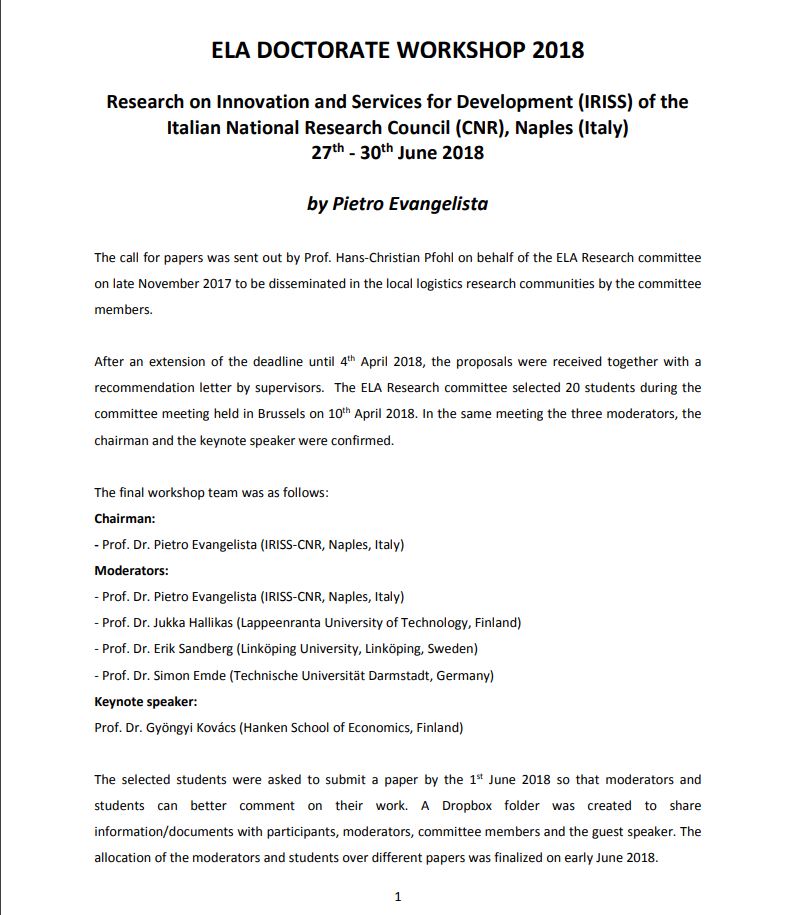
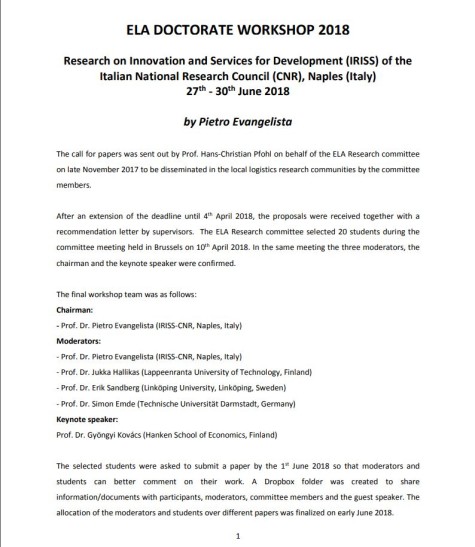
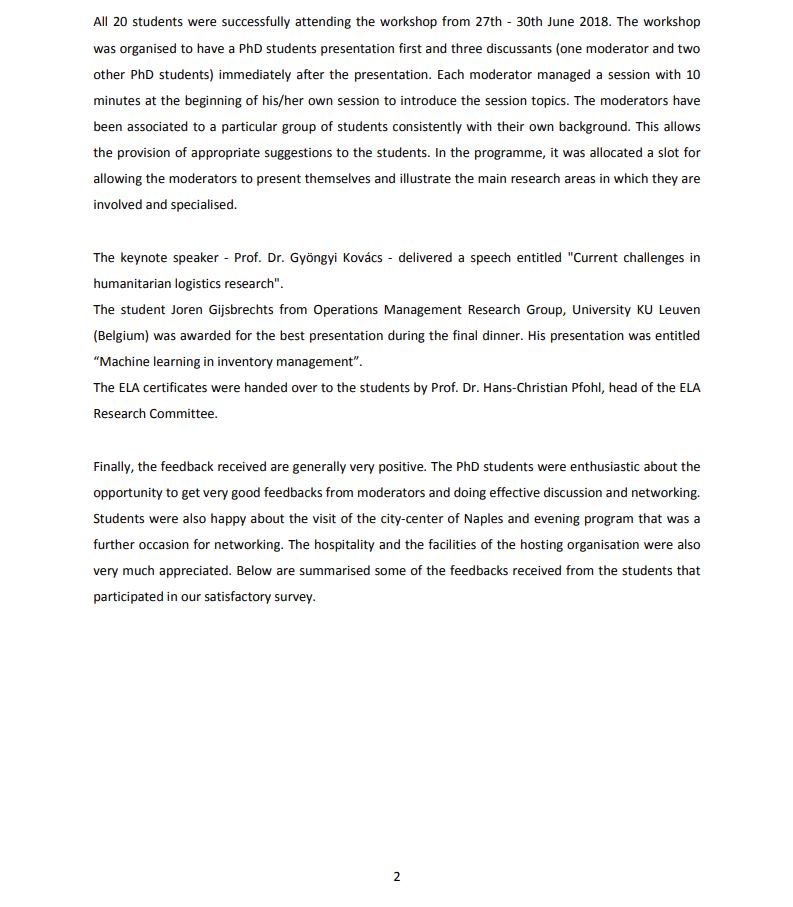
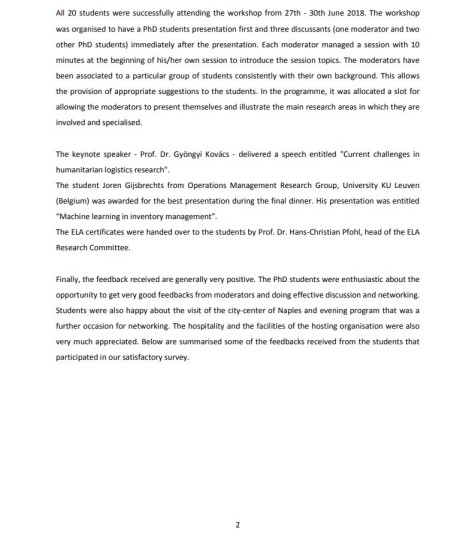
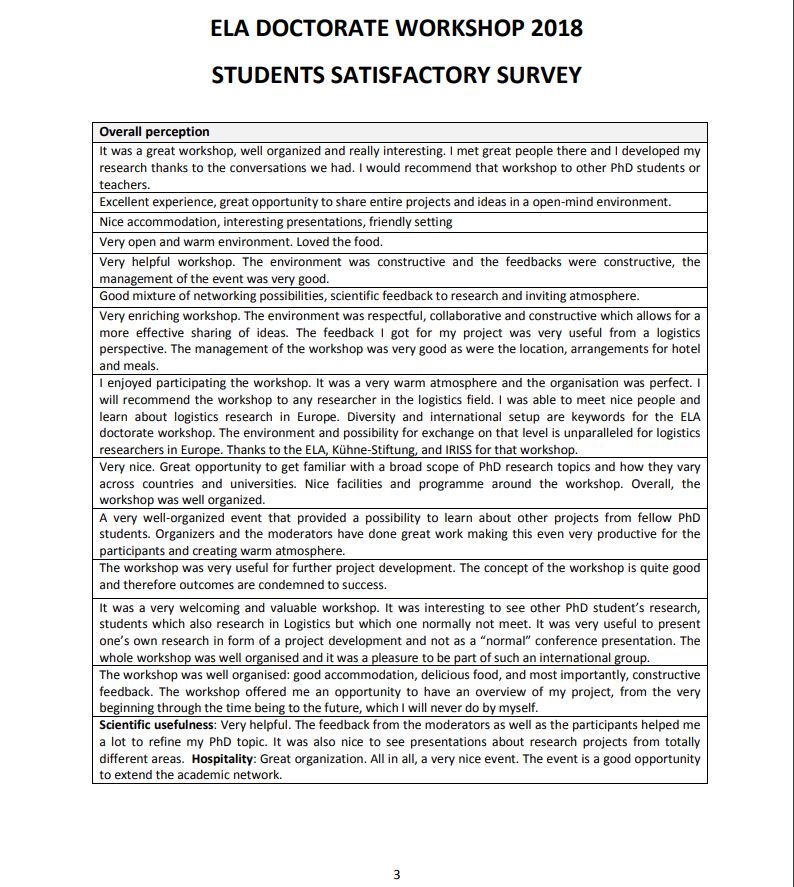
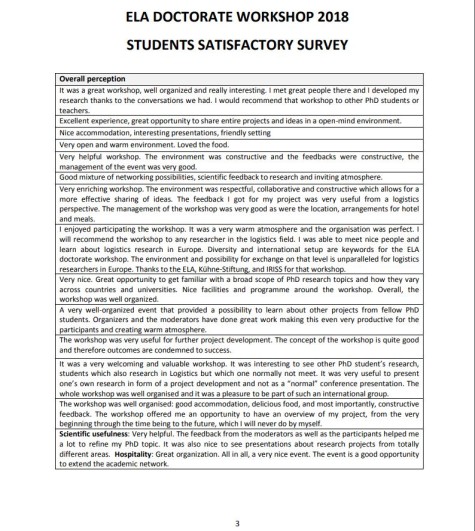
ELA Doctorate Workshop 2018, June 27th-June 30th 2018 in Naples, Italy
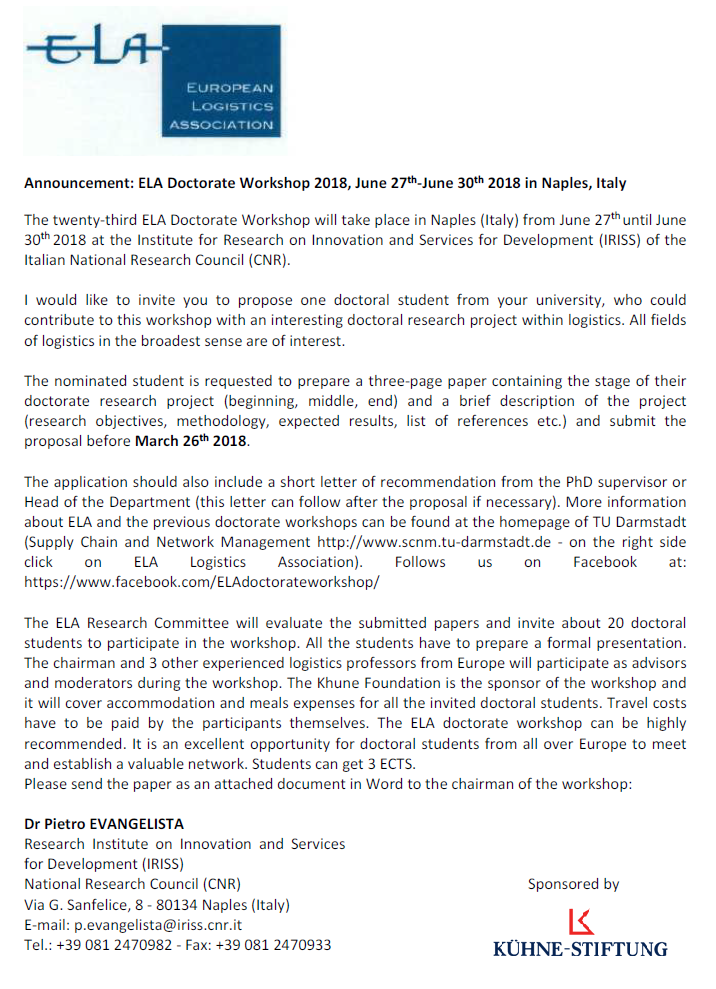
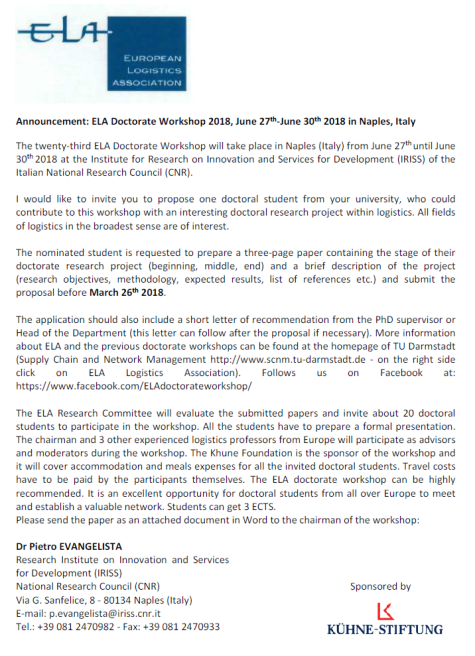
22-nd ELA Doctorate Workshop 2017, 21-st to 24-th of June 2017 in Wrocław (Poland)
Report by Jarosław Witkowski
The decision about location the 22-nd ELA Doctorate Workshop at the Wroclaw University of Economics in Poland was taken by members of Research Committee Meeting in Brussels on 30-th of November 2016.
The final team of workshop was as follows:
Keynote Speaker:
Prof. Dr. Alan McKinnon (Kuehne Logistics University, Germany)
Moderators:
Chairman and Session I: Prof. Dr. Jaroslaw Witkowski (Wroclaw University of Economics, Poland)
Session II: Prof. Dr. Gunter Prockl (Copenhagen Business School, Denmark)
Session III: Prof. Dr. Luuk Veelentruf (Eindhoven University of Technology, Netherlands)
Session IV: Prof. Dr. Claudio Ferrari (University of Genova, Italy)
The call for PhD proposals was sent out by Chairman of ELA Research Committee Prof. Hans Christian Pfohl in 2-nd of December 2016. As last year the announcement was also spread out by the others research committee and work-shop team members. Until the deadline 3-rd of March 2017 the chairman of the workshop received PhD proposals and letters of recommendation signed by supervisors from 12 countries. The participants of next the ELA Research Committee in the meeting in Brussels in April selected 20 applications and decided about their allocations to the responsible moderators based of their own academic backgrounds . Taking into account the suggestions from the last years, all of the accepted three pages PhD concepts were visible for all participants about two months before the beginning of 22-ed ELA Doctorate Workshop in Wroclaw.
The workshop was organized within four sessions with five presentations as follows:
- 15 minutes PhD proposal presentation,
- 10 minutes moderator questions and discussion,
- 5 minutes questions from two students appointed as a opponents.
According to the agenda of the workshop the keynote speaker as well as all the moderators introduced themselves and described the contemporary logistics research topics in which they have been involved in. In the middle of the next day of the workshop Prof. Alan McKinnon gave very interesting lecture under the title: “A Global Shortage of the Logistics Skills? Issues, Polices and Research Challenges”. In the end of the formal part of the workshop Prof. Hans Christian Pfohl as a chairman of the ELA Research Committee handed over the special certificates to all students who presented their PhD proposals.
During the final dinner the moderators awarded the best student presentation by Emine Zehra Akgun from Edinburgh Napier University in UK. The dinner speaker was Krzysztof Dwornik vice-president of Trans.eu innovative company who is provider of electronic freight exchange and computer systems to automate logistics processes. The feedback re-cived from all participants, related both the scientific as well as social network perspectives of the workshop, was gen-erally very positive.
Announcement: ELA Doctorate Workshop 2017, June 21st – June 24th 2017 in Wroclaw, Poland
The twenty-second ELA Doctorate Workshop will take place in Wroclaw, Poland, from June 21st – June 24th 2017 at the Wroclaw University of Economics.
I would like to invite you to propose one doctoral student from your university, who could contribute to this workshop with an interesting doctoral research project within logistics. All fields of logistics in the broadest sense are of interest.
The nominated student is requested to prepare a three-page paper containing the stage of their doctorate research project (beginning, middle, end) and a brief description of the project (research objectives, methodology, expected results, list of references etc.) and submit the proposal before March 3rd 2017.
The application should also include a short letter of recommendation from the PhD supervisor Head of the Department (this letter can follow after the proposal if necessary). More information about ELA and the previous doctorate workshops can be found at the homepage of TU Darmstadt (Supply Chain and Network Management http://www.scnm.tu-darmstadt.de (on the right side click on ELA Logistics Association)
The ELA Research Committee will evaluate the submitted papers and invite about 20 doctoral students to participate in the workshop. All the students have to prepare a formal presentation. The chairman and 3 other experienced logistics professors from Europe will participate as advisors and moderators during the workshop.
Accommodation and meals will be free for all the invited doctoral students. Travel costs have to be paid by the participants themselves. The ELA doctorate workshop can be highly recommended. It is an excellent opportunity for doctoral students from all over Europe to meet and establish a valuable network. Students can get 3 ECTS.
Please send the paper as an attached document in Word to the chairman of this year’s workshop:
Prof. Dr. Jaroslaw Witkowski
Wroclaw University of Economics
Department of Strategic Management and Logistics
Komandorska Street 118/120
53-345 Wroclaw, Poland
e-mail: jaroslaw.witkowski@ue.wroc.pl
Tel. +48 501090903
21st ELA DOCTORATE WORKSHOP 2016, June 22nd – June 25th 2016 in Vienna, Austria
Report by Pietro Evangelista
The call for papers was sent out by Prof. Hans Christian Pfohl on behalf of the ELA Research committee in late November 2015 to be disseminated in the local logistics research communities by the committee members.
After an extension of the deadline until 12th March 2016, 37 proposals were received together with a recommendation letter by supervisors.
The ELA Research committee selected 20 students out of the 37 applicants during the committee meeting held in Brussels on 12th April 2016. In the same meeting the three moderators, the chairman and the keynote speaker were confirmed. The final workshop team was as follows:
Chairman:
- Prof. Dr. Pietro Evangelista (IRISS-CNR, Naples, Italy)
Moderators:
- Prof. Dr. Pietro Evangelista (IRISS-CNR, Naples, Italy)
- Prof. Dr. Tina Wakolbinger Vienna University of Economics and Business, Vienna, Austria)
- Prof. Dr. Jaroslaw Witkowski (Wroclaw University of Economics, Wroclaw, Poland)
- Prof. Dr. Erik Sandberg (Linköping University, Linköping, Sweden)
Keynote speaker:
- Prof. Dr. Sebastian Kummer (Vienna University of Economics and Business, Vienna, Austria)
One student required a visa and invitation letters that were issued and sent to the Austrian embassy in the UK. The selected students were asked to submit a paper by the 1st June 2015 so that moderators and students can better comment on their work. A Dropbox folder was created to share information/documents with participants, moderators, committee members and the guest speaker. The allocation of the moderators and students over different papers was finalized on early June 2016.
All 20 students successfully attended the workshop from 22nd until 25th June 2016. The workshop was organised to have a PhD students’ presentation first and three discussants (one moderator and two other PhD students) immediately after the presentation. Each moderator managed a session with 10 minutes at the beginning of his/her own session to introduce the session topics. The moderators were allocated to a particular group of students consistently with their own background. This allowed the provision of very appropriate suggestions to the students. In the programme, a slot was allocated for allowing the moderators to present themselves and illustrate the main research areas in which they are involved and specialised. The keynote speech from Prof. Dr. Sebastian Kummer was given during the workshop programme.
The following two students were awarded for the best presentation during the final dinner:
- Ahmed El-Said, University of Huddersfield (UK)
- Daniel Reinhardt, Technische Universität Darmstadt (Germany)
The ELA certificates were handed over to the students by Prof. Dr. Hans-Christian Pfohl, head of the ELA Research Committee. Finally, the feedback received was generally very positive as confirmed by the comments from the participants. The PhD students were enthusiastic about the opportunity to get very good feedback from moderators and doing effective networking. Students were happy about the evening program that allowed them to network. The hospitality of the Vienna University of Economics and Business was also very much appreciated.
Announcement: ELA Doctorate Workshop 2016, June 22nd – June 25th 2016 in Vienna, Austria
The twenty-first ELA Doctorate Workshop will take place in Vienna, Austria, from June 22nd – June 25th 2016 at the Vienna University of Economics and Business.
I would like to invite you to propose one doctoral student from your university, who could contribute to this workshop with an interesting doctoral research project within logistics. All fields of logistics in the broadest sense are of interest.
The nominated student is requested to prepare a three-page paper containing the stage of their doctorate research project (beginning, middle, end) and a brief description of the project (research objectives, methodology, expected results, list of references etc.) and submit the proposal before February 22nd 2016.
The application should also include a short letter of recommendation from the PhD supervisor or Head of the Department (this letter can follow after the proposal if necessary). More information about ELA and the previous doctorate workshops can be found at the homepage of TU Darmstadt (Supply Chain and Network Management http://www.scnm.tu-darmstadt.de (on the right side click on ELA Logistics Association)
The ELA Research Committee will evaluate the submitted papers and invite about 20 doctoral students to participate in the workshop. All the students have to prepare a formal presentation. The chairman and 3 other experienced logistics professors from Europe will participate as advisors and moderators during the workshop.
Accommodation and meals will be free for all the invited doctoral students. Travel costs have to be paid by the participants themselves. The ELA doctorate workshop can be highly recommended. It is an excellent opportunity for doctoral students from all over Europe to meet and establish a valuable network. Students can get 3 ECTS.
Please send the paper as an attached document in Word to the chairman of this year’s workshop:
Prof. Pietro EVANGELISTA, PhD
IRISS-CNR and University of Naples Federico II P.le Tecchio 80
80125 Naples (Italy)
E-mail: p.evangelista@unina.it
Tel. +39 081 7682960
Fax +39 081 7682154
Reports about previous workshops
20th ELA Doctorate Workshop 2015 June 24th – June 27th – Schindellegi (Switzerland)
The call for papers was sent out by Prof. Hans-Christian Pfohl, Technische Universität Darmstadt (D), on behalf of the ELA Research Committee with the deadline of 20th February 2015 in order to be disseminated in the local logistics research communities by the committee members. The moderators of the workshop were Prof. Pietro Evangelista, IRISS-CNR and University of Naples Federico II (I), Prof. Elizabeth Jackson, Royal Veterinary College London (UK), Prof. Erwin van der Laan, Erasmus University Rotterdam (NL) and Prof. Dragan Cisic, University of Rijeka (HR).
18 students from all over Europe successfully attended the workshop from June 24th – 27th 2015. The workshop was structured to have a PhD student’s presentation and three discussions (one moderator and two other PhD students). Each moderator managed a session with 10 minutes at the beginning of his/her own session to introduce the session topics. An important decision was to associate the moderators to a particular group of students compatible with their own background. This allows the provision of very appropriate suggestions to the students. In the programme, there was a slot for allowing the moderators to present themselves and illustrate the main research areas in which they are involved. In addition, there was a prominent guest speaker (Prof. Martin Christopher, Cranfield University (UK)) who gave a presentation during the workshop programme. Also this year, an award for the best presentation was given to two students who were equally evaluated by the chairman and moderators. The ELA-certificates for the participation in the workshop were handed to the students by the head of the ELA Research Committee, Prof. Hans-Christian Pfohl during the closing dinner.
The feedback of the students was generally very positive. The PhD students were enthusiastic about the opportunity to get very good comments from the moderators. The presentation that the guest speaker gave was very stimulating for students and there was a lively debate after the presentation. Students were happy about the evening programme that allowed them to network and the hospitality of the Kuehne foundation was also very much appreciated.
19th ELA Doctorate Workshop 2014, June 25th – June 28th in Hamburg
The Call for Papers was sent out by Prof. Hans-Christian Pfohl (chairman of the ELA-Research Committee; TU Darmstadt, Darmstadt, Germany) to the members of the ELA-Research Committee with the request to forward proposals to the chairman of the workshop Dr. Pietro Evangelista (IRAT-CNR and University of Naples Federico II, Naples, Italy).
In the following, 18 students were selected by the ELA-Research Committee. They were asked to prepare an extended paper about their research, a short CV, as well as questions about their PhD programs and publishing. The documents were shared using a Dropbox folder. Thus, every student was able to prepare the topics of the other participants and, at least, to prepare questions for two other assigned research projects.
During the Workshop at THE KLU (Kühne Logistics University) in Hamburg, the moderators Prof. Dr. Manfred Gronalt (Institute of Production and Logistics, University of Natural Resources and Life Science, Vienna, Austria), Prof. Mohamed Naim (Cardiff Business School, Cardiff, UK), Prof. Dr. Sandra Transchel (Kühne Logistics University, Hamburg, Germany) and the chairman moderated four sessions where the students presented and discussed their work. The moderators also presented their current research projects and discussed them with the students.
At the last day of the workshop the invited speaker Prof. Eric Ballot (Centre de Gestion Scientifique, Mines ParisTech, Paris, France) inspired the students with his presentation on “Research avenues and challenges opened in logistics by new trends in information technologies”. Visiting the Hamburg Harbor using the Kühne & Nagel barge was another highlight and a great chance for networking.
The workshop concluded with a gala dinner, Prof. Hans-Christian Pfohl, Prof. Rod Franklin (Kühne Logistics University, Hamburg, Germany) and Mr. Martin Willhaus (Kühne-Foundation, Schindellegi, Switzerland) used to encourage the students strongly for the further development of logistics as a substantial field for the future. Finally, Prof. Hans-Christian Pfohl handed over the workshop certificates and Dr. Pietro Evangelista honored Tim Lamballais (Erasmus University Rotterdam, The Netherlands) for the best workshop presentation.
18th ELA Doctorate Workshop 2013, June 26th – June 29th in Schindellegi (CH)
The Call for Papers was sent out by Prof. Hans-Christian Pfohl to the members of the ELA-Research Committee with the request to forward it to professors within the local logistics research communities on 13th December 2012. The candidates were required to submit a three-page paper, with a recommendation letter from their supervisors. The ELA-Research Committee together with the chairman of the workshops selected 20 students out of the applicants on 16th April 2013. The selected students were asked to submit an extended paper by the end of May 2013, so that moderators and students can better comment on the work. A Dropbox folder was created to share informations/documents with participants. The allocation of the moderators and students over papers was finalized on 30th May 2013. All 20 students were successfully attending the workshop from 26th June to 29th June 2013. Prof. Dongping SOng (Plymouth University) was the chairman of the workshop. Professors Patrick Beullens (University of Southhampton), Christoph Bode (University Tillburg) and Pietro Evangelista (University of Naples) acted as moderators. Prof. Michael Bourlakis (Brunnel University) held a keynote speech on „Contemporary Research Challenges in Logistics & Supply Chain Management: Insights from Empirical Work“. Prof. Hans-Christian Pfohl (Technische Universität Darmstadt) in his function as the chairman of the ELA-Research Committee handed over the workshop certificates. Before closing dinner the workshop participants visited the monestary Einsiedeln with Mr. Martin Willhaus, who supported the workshop through all the days with high commitment, as a very experienced guide.
All the feedback that i recieved regarded that the workshop was rewarding and many would like to come back again. The students enjoyed the atmosphere and the hospitality of the Kuehe Foundation has been highly appreciated! One suggestions is that students would like to have written feedbacks from the moderators and other allocted students on their papers. Below you will find the anonymous feedback from students.
- The accommodation and the organized programs were great and very entertaining. I found the format of the presentations (15 minutes presentations + 15 minutes discussion) great. I was fond of that really valuable conversations developed throughout the workshop and there was much room for socializing and giving/receiving feedback. Also, moderators feedback and presentations were very interesting to me.
- I really liked that the program was designed in such a way (long coffee breaks as well as free time in the evening of the first day) that you were given the opportunity to network as well as discuss you research with other PhD students. I also very much enjoyed the evening activities on the last day.
- The workshop was great with a variety of subjects from PhD students all around Europe. The Moderators were great, friendly and cooperative. The hotel was amazing.
- I think a lot of things were good. In fact the organization was perfect, everything was planned into details. It was really a very good job done by the foundation and you.
- I have been very glad to meet 25 logistics PhD and researchers, all very motivated, passionnate and keen on sharing advices, insights.The accommodation was more than satisficing.The rhythm of presentations, while too short to get into one's subject, was long enough to present the main lines of our research, and short enough to avoid people from taking the whole 30 minutes slot to talk, which, in some cases, would be very tiring for the audience, especially if, afterwards, we have no time left to ask questions.
- A very positive atmosphere and genuine interest in each others work, which lead to useful constructive feedback – also to those contributions that were still in a very early phase.
17th ELA Doctorate Workshop 2012, June 27th – June 29th in Schindellegi (CH)
The call for papers was sent out to the ELA committee members with the request to forward it to professors within the local logistics research communities. The candidates submitted a paper, and the professors sent a recommendation letter. In the end, the program committee selected 20 students from all over Europe. The selected students were asked to submit an extended abstract, a CV and photo. These were used to produce a book of abstracts, and a book with photos and CVs. Also, the CVs and photos of the moderators and guest speakers were produced. Because of three last-minute cancellations 17 students attended the workshop.
Prof. Rob Zuidwijk (Erasmus University Rotterdam) was the chairman. Professors Maria Huge-Brodin (Linköping University), Roberto Pinto (University of Bergamo), Prof. Dongping Song (Plymouth University) acted as moderators and Prof. Gyula Vastag (University of Pannonia Veszprém) had a keynote speech on „Global Surveys: Promises and Pitfalls“. Prof. Alan McKinnon (Heriot-Watt University in Edinburgh and Kühne Logistics University) was the dinner speaker at the closing gala-dinner. Prof. Hans-Christian Pfohl (TU Darmstadt) in his function as the chairman oft he ELA-Research Committee handed over the workshop certificates. Before the closing dinner the workshop participants visited the monastery Einsiedeln with Mr. Willhaus from the Kuehne Foundation as a very experienced guide.
Below you will find a short selection of feedback from the moderators and PhD students.
- The majority of presentations are in high quality, above many international conference presentations. The involvement of multiple PhD students in discussions is very good. There were plenty opportunities for students and moderators to exchange ideas. The mix of many countries, many nationalities, different stages of PhD study, different research methodologies is another good point.
- Moderators/faculty were very helpful. Moderators/faculty were experts in different areas of logistics which helped us to get better overall feedback. The chosen group of students came from different areas within logistics and this exposed me to new and exciting streams of latest research in logistics. The workshop gave appropriate feedback to each of the students individually. Working environment was very friendly and productive.
- It was good to meet PhD students from all over Europe! The discussions about each paper. It was very good to have both seniors and PhD students as discussants.
16th ELA Doctorate Workshop 2011, June 29th – July 2nd 2011 in Schindellegi (CH)
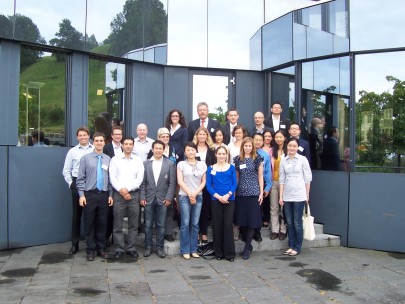
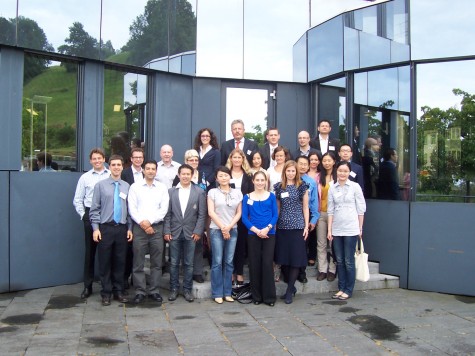
ELA's 16th annual doctoral workshop took place on June 29th- July 2nd 2011, in Schindellegi, Switzerland. It was sponsored by the Kuhne Foundation and hosted in the Kuhne + Nagel’s facilities.
Nineteen PhD students from Germany, France, Italy, the Netherlands, Poland, Sweden and the U.K. were selected and participated in this year’s workshop. Prof. PatrikJonsson was the chairman. Professors Rob Zuidwijk, Chee Wong and WłodzimerzRydzkowski participated as moderators and prof. Nathalie Fabbe-Coste had a keynote speech on ‘methodological considerations in logistics research’. Dr. Rod Franklin was dinner speaker of the Thursday evening gala-dinner at Restaurant Luegeten. Prof. Hans Christian Pfohl, Chairman of the ELA Research & Development Committee, had aclosing speech and handed over the workshop certificates during social event on Friday afternoon. The managing director of Kuhne Foundation, Martin Willhaus, was a very appreciated host who participated during the entire workshop.
All PhD students presented work-in-progress papers and opposed on other students’ papers. A wide spread of logistics topics were presented and discussed. Some common topics were sustainable supply chains, supply chain integration, supply chain relationships and risks, and warehousing. There was also a wide spread of methodological approaches. There were studies based on single and multiple case studies, survey studies, modeling, simulation and optimization. In addition to presenting and discussing the PhD students’ own work, there were break-out sessions and discussions about similarities and differences between PhD programmes in Europe, and about publishing in logistics journals. There were also invited speeches about research methodologies and research relevance. An important aim of this event is to let PhD students meet with students from other European logistics environments and to meet and discuss with some professors in the field. It is consequently to network and have fun.
The 17thELA-Doctorate Workshop will be sponsored again by the Kuehne-Foundation. It will be organized at Schindellegi (CH) June 27th – June 29th 2012.
Some words from the participants of the previous workshop:
“The location and accommodation were excellent, Kuhne and Nagel, particularly Martin Willhaus was an excellent host. We were all made to feel very special and it was fantastic when Mr. Willhaus took us to that beautiful restaurant overlooking Lake Zurich. The feedback from the European professors moderating the conference was great and illuminating for all students presenting. I found the conference gave me a lot of ideas on how I will shape my research and it has really motivated me. The conference was well organised with good planning and execution. The conference had a really good selection of students with different research topics. I also really liked the guest speaker Prof Nathalie, she did a really good presentation which I found invaluable” (Sarah Shaw, Heriot-Watt University)
“I think this is a very cozy workshop. Not too many participants, but covered quite a broad and comprehensive research area in the supply chain field. Sometimes when we focus on our own research and meet people from the same discipline, our view can be quite narrowed. In this workshop, I got to know other types of research, different research approaches, etc. all with the same domain of supply chain.”(Xiaoyun Bing (University of Wagenigen)
“The conference provided us a chance to practice criticism, see what other PhD students are doing and present our work in a relaxing and friendly environment.”(SuntichaiKotcharin University of Manchester)
“The Kühne foundation was a a very generous host, and especially Martin Willhaus took great care of us.” (UniMartinsen, Linköping University)
“The presentations and discussions were energised and the direction given was extremely useful. The entertainment was nicely balanced, and the professors engaging.”(Philip Greening, University of Cranfield)
“I did really enjoy ELA. It was a great platform for new researchers to get to know each other across Europe. I made friends afterward. Secondly, the size of the group was really good.”(Linda Xu, University of Plymouth)
“Networking with so many students from various countries and universities was truly a great experience.”(Rui Wang, Technical University of Munich)
15th ELA Doctorate Workshop 2010, June 29th –18th/19th 2010 in Saint Nazaire, France
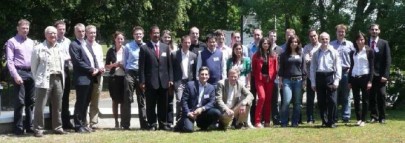
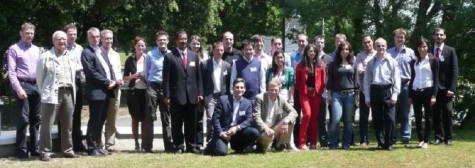
The ELA doctoral workshop took place in the PASCA Centre (Centre of Purchasing And Supply Chain Atlantic) in mid-June. Enjoying the western climate, professors and students spent two days in sesssions presenting papers and discussing research and methodology.
For the 15th year, students from laboratories across Europe submitted abstracts of their theses (subject, research, directions, methodology). The ELA coommittee met in March to select the 18 best papers.
During two full days, 18 students presented their work: more than a simple presentation, the ELA doctorate workshop is one of the important opportunities to progress on a thesis. Each participant can exchange with other students who work on similar subjects. PhDs from prestigious universities can also encourage and redirect the project:
-up date on the information, articles, etc
-questions to clarify some aspects
-new directions for futurre esearch
-alternative methodologies
Moderators
Dr Allan Woodburn -University of Westminster, United Kingdom
Prof Dirk Cattryss -K.U. Leuven, Belgium
Prof Fabrizio Dallari -Università Carlo Cattaneo LIUC, Italy
Prof Patrik Jonsson – Chalmers University of Technology, Göteborg, Sweden
Prof Thierry Sauvage – Audencia Nantes School of
Management and CRET-LOG, France
Prof Pierre Dejax – Ecole des Mines de Nantes, France
Speakers
Prof Hans-Christian Pfohl – Darmstadt University, Germany
Prof Jacob Wijngaard – University of Groningen, Netherlands
Students
ALSABT Abdulmonem – University of Hull, United Kingdom
BIERBOOMS Remco – Eindhoven University of Technology, Netherlands
BJELIC Nenad – University of Belgrade, Serbia
BOSCHIAN Valentina – Università degli Studi di Trieste, Italy
COLICCHIA Claudia – Carlo Cattaneo University LIUC, Italy
DUBEDOUT Hugues – Ecole des Mines de Nantes, France
ENKE Anja – Berlin University of Technology, Germany GEVAERS Roel – University of Antwerp, Belgium
KARAMPERIDIS Stavros – Newcastle University, United Kingdom
KELLNER Florian – University of Regensburg, Germany
KUDLA Nicole – University of St Gallen, Switzerland
PAN Shenle – ENSMP Ecole Nationale Supérieure des Mines de Paris, France
RIJPKEMA Willem -Wageningen University, Netherlands
STOCKENBERGER Dominik – Technische Universität München, Germany
TISO Annamaria DVT -Politecnico di Bari, Italy
TRAN Minh Hoang – Audencia Nantes School of Management, France
VEGA Diego – Unversité Aix-Marseille II, CRET-LOG, France
ZIEGLER Hans-Peter – Karlsruher Institut für Technologie (KIT), Germany
14th ELA Doctorate Workshop, June 24th –27th 2009 in Saint Nazaire, France
As in previous years, students studying for a doctorate in logistics met with European logistics professors in Nantes-Saint Nazaire, France. More than 25 papers have been presented and discussed.
Wednesday 24th June 2009
19:30 Kick-off Meeting and Dinner
Introduction to the Workshop, Presentation of the agenda, Anthony Beresford, ELA Doctorate Workshop Organiser
Thursday 25th June 2009
8.30 Case Discussion in three parallel working sessions groups of six with Moderator
10:00 Discussion of results of working sessions – 20 minutes per group presentation
10:45 Coffee break
11.00 Session 1:
11.00: Mihaela Turtoi
11.30: Konstantin Gerbert
12.00: Reinder Pieters
12:30 Lunch
13:30 A session with Dr. Andrew Palmer, Cranfield University “The use of modelling in PhD research”
14:30 Coffee break
14:45 Session 2:
14.45: Andreas Busch
15.15: Laetitia Dari
15.45: Elodie Kacioui-Maurin
16:15 Coffee break
Session 3:
16:30: Yina Chai
17:00: Luai Jraisat
17.30: Xin Shen
19:30 Dinner
Friday 26th June 2009
8:30 Session 4:
8.30: Angela Tumino
9.00: Andreas Glas
10:00 Coffee break
10:15 Session 5:
10:15: Alicja Nerc-Pelka
10:45: Gali Sherman
11:15: Luca Urciuoli
12:00 Lunch
13:00 Session 6:
13.00: Elena Legnani
13.30: Christian Schwede
14.00: Heike Wrobel A Collaborative model for after sales service chains
14:45 Session 7:
14.45: Hurbert Virtos
15.15: Ira Haavisto
15.45: Joos Van Den Bergh
16:15 – 17:00 Workshop Closure
19:15 Evening Dinner and Certificate Award, Hans Christian Pfohl, Member of the ELA Board, Chairman of the ELA Research & Development Committee
Report of the 13th ELA-Doctorate Workshop in Grainau, June 25-27.

On Wednesday, the workshop started with a short Who-is-Who introduction followed by a joint dinner. After the dinner, Martin Willhaus gave a short presentation to introduce this year’s sponsor, the Kühne-Stiftung. Later, the opportunity for a public soccer viewing was offered by the Jungbauernschule.
Thursday morning, Martin Schneyder from the Jungbauernschule gave a welcome address to the participants. The scientific program started with the “Research proposal competition” used in previous workshops as a warm-up and team building exercise. The task for the students was
“Assume that you can apply for a 1 million euro grant to carry out a research project concerned with logistics. Please formulate a proposal for the research study. The proposal must take into account behavioural, structural (intra and the inter-organisational) and technological aspects as well as identifying consequences for public policy makers, business and the scientific community.”
The topics chosen by the three groups were:
- Commuter Service for the City of Hamburg
- Green-Logistics – The impact of Consumer Behavior
- Green City Logistics
On Thursday, 7 student-presentations and the Simulation tutorial by Alexander Verbraeck were delivered. Only the first scheduled presentation by Alexander Bode had to be cancelled because of last minute sickness. The format to have a tutorial on one of the core research methodologies in Logistics Research was well appreciated by the students and should be maintained in the future. Thursday evening, the Jungbauernschule offered the dinner as a barbeque which was excellent.
On Friday, 11 student-presentations were given. After the lunch-break, the participants were offered a guided walking tour in Grainau by Martin Schneyder. The evening dinner took place in the Restaurant Höhenrain in Grainau. The Chairman of the ELA Research and Development Committee, Hans Christian Pfohl handed out the participation certificates. The format to have a joint dinner and certificate award at Friday evening with the purpose to minimize the number of early departures has been quite successful as only one student left prior to the dinner and the majority of the students stayed until Saturday.
The overall quality of the student-presentations was as expected from the proposals. In hindsight, two of the weaker proposals should not have been accepted. The cooperation with the Jungbauernschule was excellent.
12th ELA Doctorate Workshop
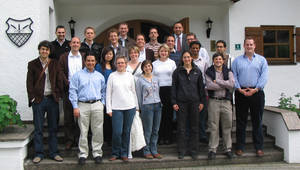
ELA Annual Doctorate Workshop (2007
Download Programme 2007 (wird in neuem Tab geöffnet)
The Twelfth Annual ELA Doctorate Workshop took place between Wednesday 27th to Friday 29th of June 2007 in Jungbauernschule at Grainau in Germany. This is an excellent location, very close to Germany’s highest mountain and to the border with Austria. It was the second time that the event was held at this location and the main sponsor was again DHL solutions.
The selection of PhD students was decided during a meeting of the ELA Research & Development Committee. The Committee members assessed the research proposals submitted in a form of a 3-page abstract. Four academics with a research interest in logistics and supply chain acted as moderators during the event. The event was chaired and organised by Dr Michael Bourlakis (Brunel University Business School, UK) and the other three moderators were Prof. Dr. Michael Essig (Bundeswehr University, Germany), Dr. Tom Van Woensel (Technische Universiteit, Netherlands) and Dr Allan Woodburn (Westminster University, UK).
At the beginning of the Workshop on Wednesday afternoon, a welcome introduction and reception was organised that was supported financially by Taylor & Francis Publishers. The students, who were representing eleven different countries (Belgium, Denmark, Finland, Germany, Netherlands, Norway, Poland, Portugal, Sweden, Switzerland, UK) had the chance to get to know each other and to meet the moderators.
On Thursday morning, students formed groups with the aim of working on a research funding proposal in relation to European logistics. They considered a range of aspects and their impact on European public policy makers, businesses, scientist and other stakeholders. Moderators commented on these proposals and provided constructive feedback whilst the rest of the day was allocated for students’ presentations.
In total, eighteen students made presentations during the Workshop analysing a diverse range of topics on logistics and supply chain management issues such as, inter alia, humanitarian supply chains, packaging and logistics, maritime logistics, operational analysis of product deliveries and intermodal transportation. These presentations were chaired by the moderators who also provided relevant feedback at the end.
At the Workshop, we were also delighted to receive a keynote address by Prof. Dr. Hans-Christian Pfohl, the Chairman of the ELA Research and Development Committee, who welcomed the students and analysed contemporary issues in European logistics. During another session, Prof. Dr. Jan Dul (RSM Erasmus University, The Netherlands) shed extra light on the Case Study Methodology.
The next ELA Doctorate Workshop will run in 2008 and will allow again PhD students to meet to discuss logistics issues from various European universities.
Dr Michael Bourlakis
Brunel University Business School
11th ELA Doctorate Workshop, June 28th-30th 2006
The 11th Annual ELA Doctorate Workshop was held from Wednesday-Friday, 28-30 June 2006 in the heart of the Bavarian Alps near the Zugspitze, Germany`s highest mountain at almost 3,000 meters (10,000 feet). The ELA Research and Development Committee selected eighteen PhD students from the many applications received from across Europe to meet, present and discuss their research at the Jungbauernschule (Young Farmer´s School) Seminarhaus in Grainau, Germany. The event held for the first time at this beautiful venue in sunny and hot weather and was sponsored by a generous donation from DHL.
Students were selected based on a three-page abstract of their research proposal and four logistics and supply chain academics were on-hand to moderate presentations and discussions. Dr David Grant (Heriot-Watt University, Edinburgh, UK) organised and chaired the Workshop and was assisted by Prof Mats Abrahamsson (Linköping University, Sweden), Dr Michael Bourlakis (University of Newcastle, UK) and Prof Dr Stefan Minner (University of Mannheim, Germany).
The workshop began with a welcome introduction and reception provided by a donation from Taylor & Francis Publishers, who also supplied copies of the International Journal of Logistics: Research and Applications(IJLRA) to encourage the students to consider writing for publication even at the doctoral student stage. Mr. Martin Schneyder of the Seminarhaus introduced the facility and also led a half-hour walking tour of Grainau and surroundings during the Thursday lunch break.
The first task on Thursday morning was for the students to undertake a group project and report back to plenary on their findings. The groups had to develop a research funding proposal for a topic of their choice on European logistics taking into account behavioural, structural and technological aspects and identifying impacts on public policy, business and the scientific community. One group proposed to examine outsourcing trends and their impact on European logistics and infrastructure in the context of Asia versus Eastern Europe manufacturers.Another group wanted to investigate European competitiveness in the new logistics world and the third group considered researching how should investment be directed towards alternative urban transportation solutions for the year 2020.
Over the course of the next day and one-half nine students made twenty minute presentations of their research, developed from their abstracts, including such varied topics as heuristic methods for furniture distribution system planning, supply chain finance, functional spin-offs in logistics service markets, strategic distribution network design with concave cost functions, information sharing in transportation networks, and the effectiveness of UK fast-moving consumer goods supply chains. Fifteen minute question and feedback sessions were provided for each student and were moderated by one of the three assistant moderators.
The nine other students displayed A2 size posters of their research and for the first time were allocated ten minutes to talk about their posters and research and ten minutes for questions and feedback during the Workshop. These sessions were moderated by Dr Grant, who also led a thirty minute discussion on publishing in academic journals drawing on his experience as an author and reviewer for IJLRA and using the journal´s style and reviewer´s guidelines. Poster topics included integrated production planning for sheetmetal production, performance approximation and design of pick-and-pass order picking systems, packaging suppliers as value creators in the supply chain, and agency relationships between organizations and supply chain managers.
Student feedback about the new venue and the amended Workshop format was positive. Comments from the students included “a workshop like this gives me strength to go back home and continue my research with good confidence”, “I made some good contacts and received valuable feedback on my project”, and “it was really nice to have the possibility to see what other PhD students are doing”. The last comment reinforces one of the aims of the Workshop to bring together students from all over Europe to meet and establish a collegial network. This year eleven European countries were represented at the Workshop: Belgium, Finland, France, Germany, Greece, the Netherlands, Poland, Spain, Sweden, Switzerland and the UK.
The students were also able to meet socially during the welcoming reception, the Thursday lunch time tour, the Thursday evening barbeque put on by the Seminarhaus, and the Friday breakfast where Prof Dr Hans ChistianPfohl, Chairman of the ELA Research and Development Committee gave a keynote address around the theme of competitive superiority in logistics and supply chain management. And, as is custom for the Workshop, several students and moderators remained in Grainau for the weekend to sightsee and climb the Zugspitze, even if only by cable car.
Also as is custom, papers selected for presentation will be published together with the poster presentations by ELA as Proceedings of the ELA Doctorate Workshop 2006 and will be available, along with those of previous Workshops, from the ELA secretaries in Brussels.

